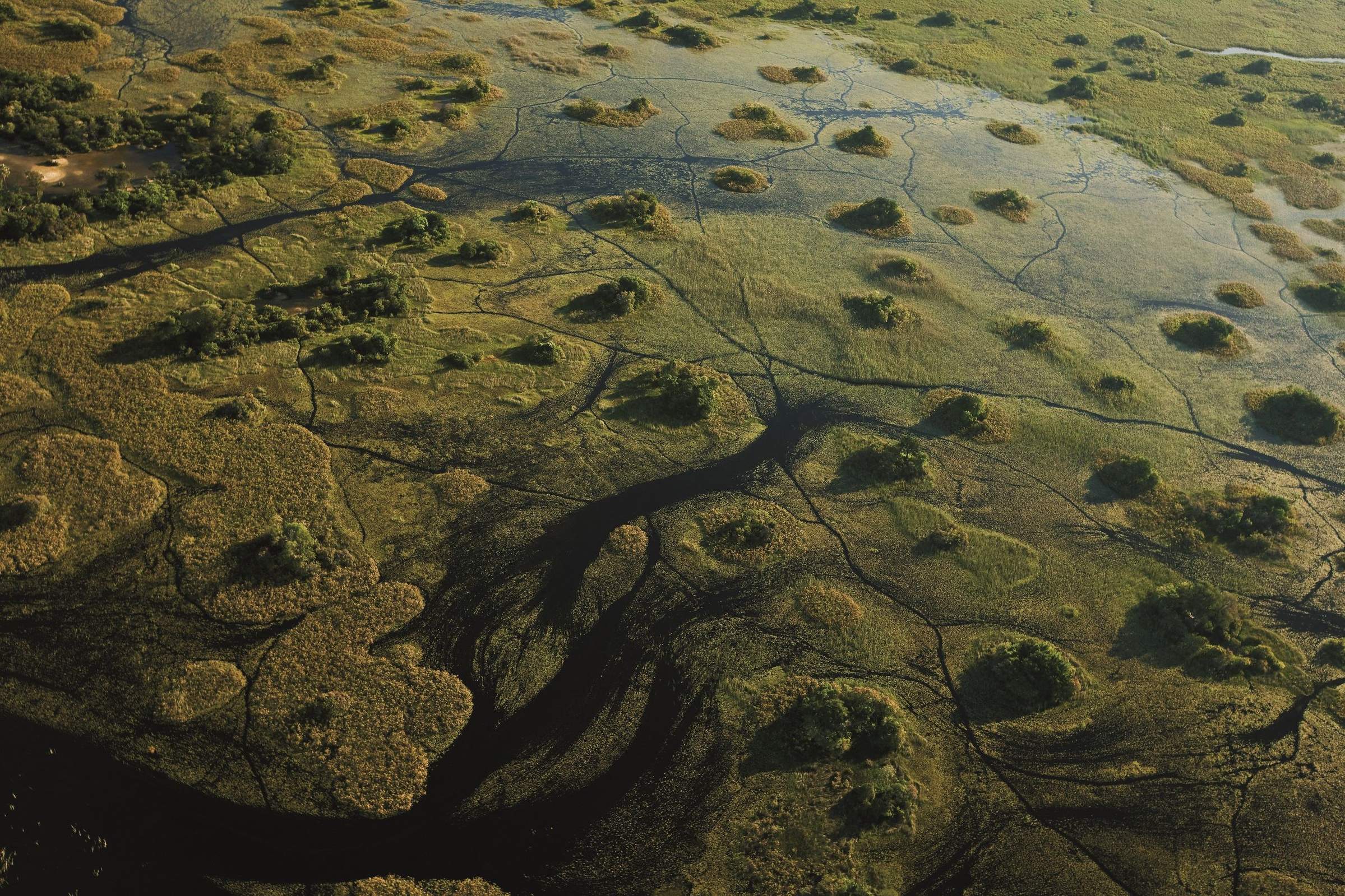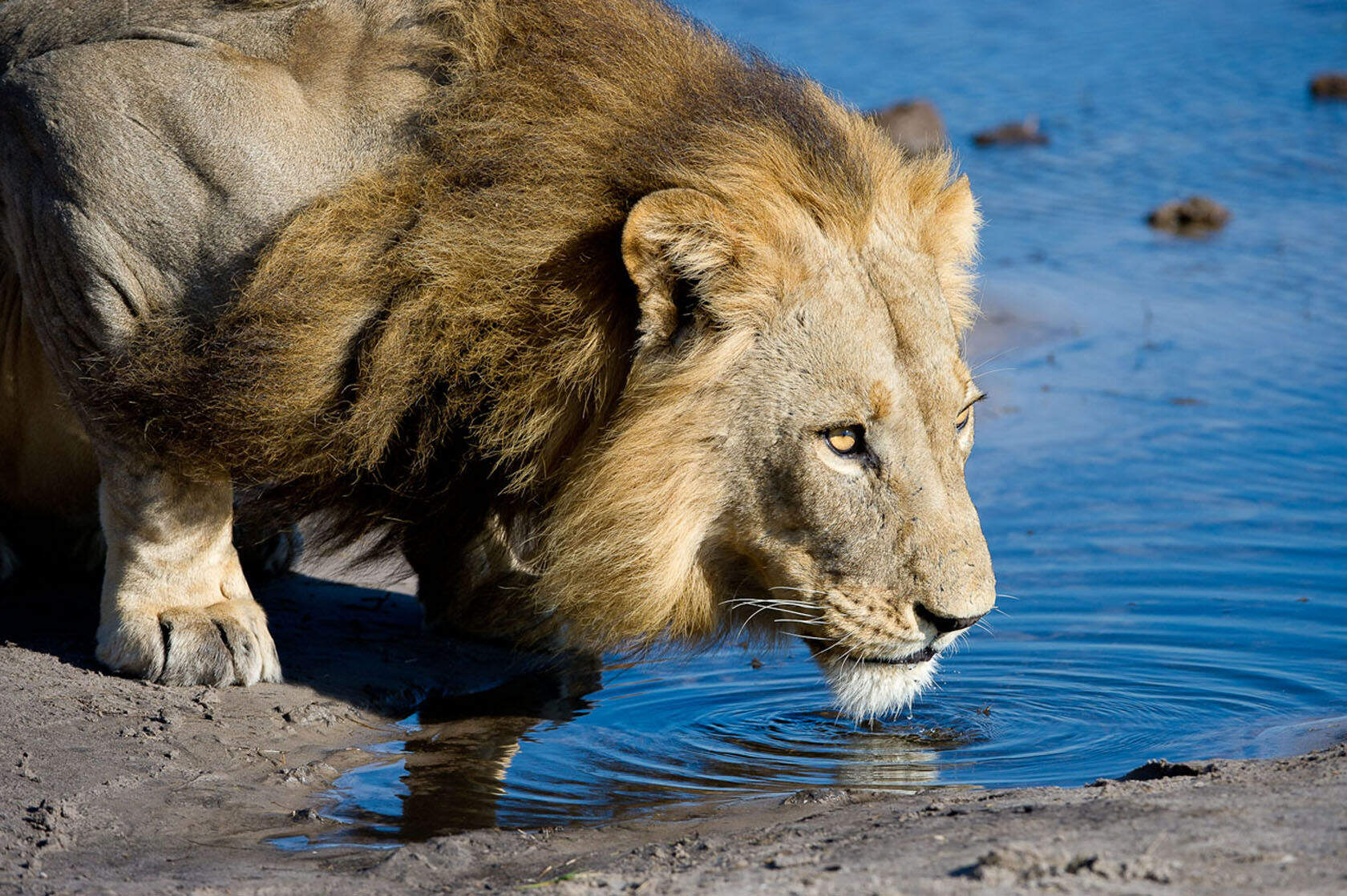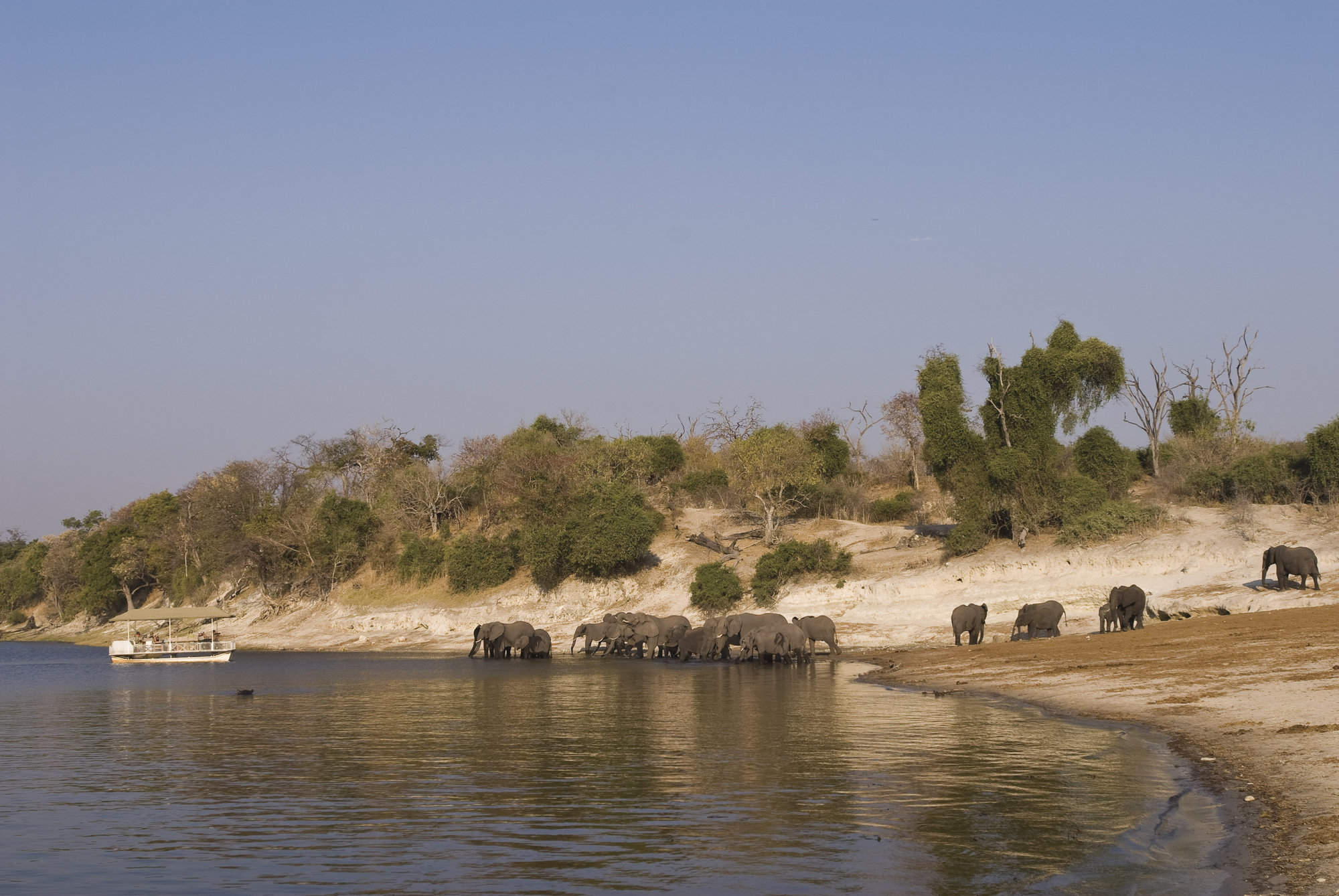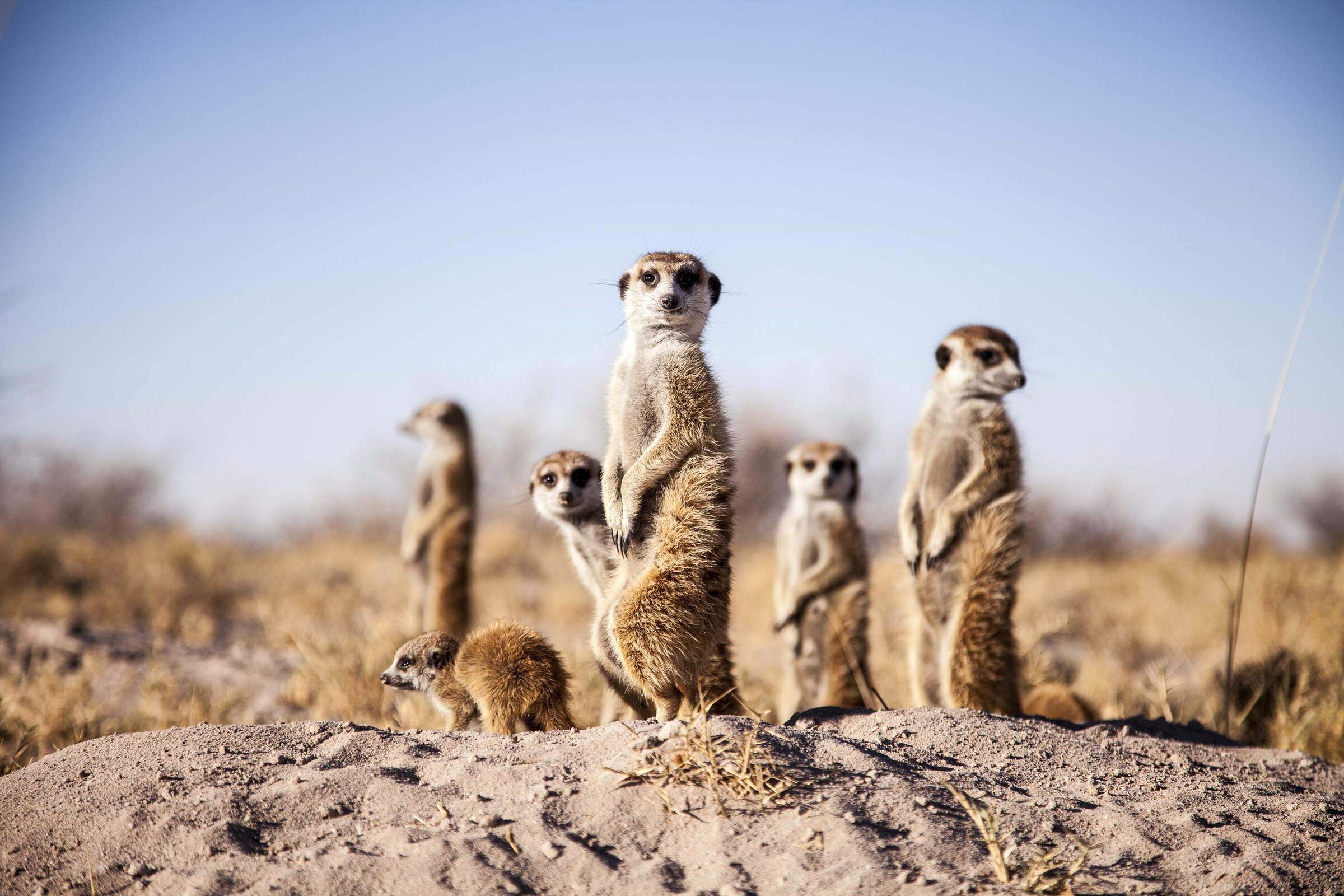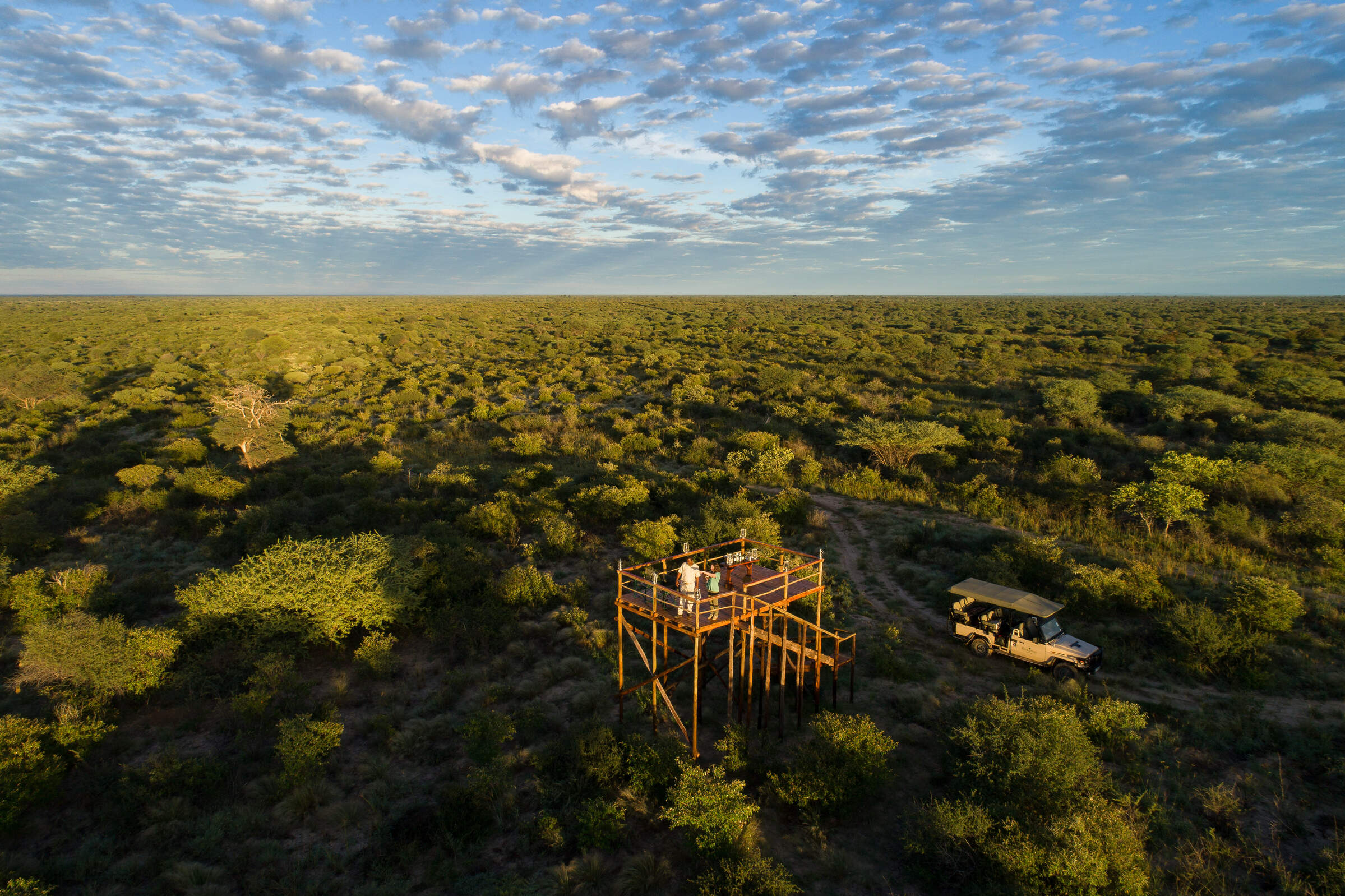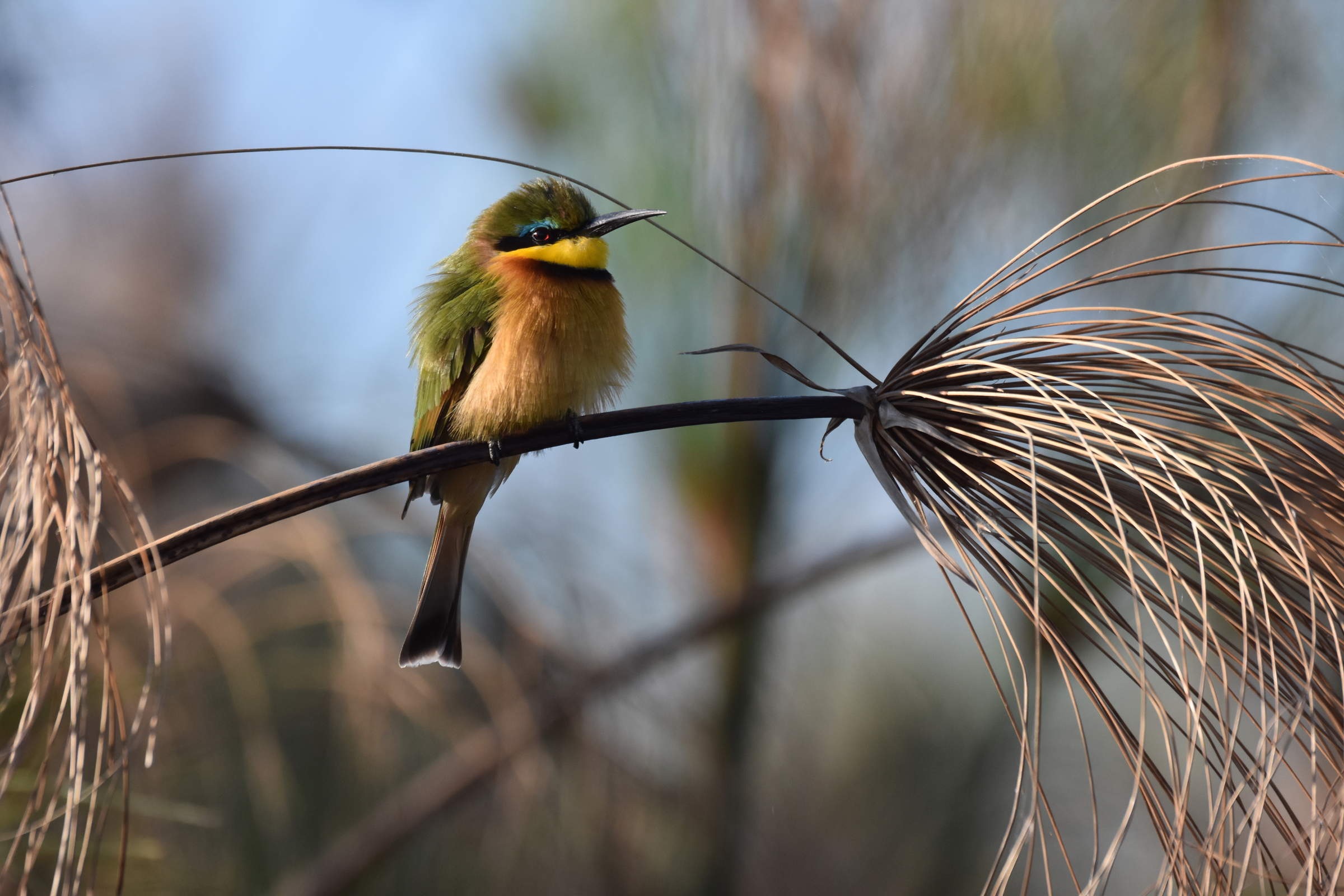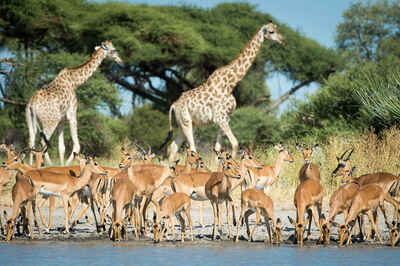
The waterhole, wildlife's meeting place
Star beds, sleep in the wild
Zebra stripes - which is which?
Game drive vehicles also use snorkels ...
The King, and possibly a spotty prince!
Moremi Game Reserve
Moremi Game Reserve
An enchanting blend of grassland, open woodland, near-hidden lakes and the odd large lagoon: this is Moremi.
Proclaimed a game reserve in the early 1960s, it lies at the heart of the Okavango Delta – and still features the old pole bridges that hint at the safaris of yesteryear.
Key to the reserve is the Mopane Tongue, a dry-land peninsula that is fringed by the beautiful Khwai River and merges into a wilderness of wetland areas.
Just outside the reserve, a scattering of small, comfortable lodges lie along the river; inside, a handful more nestle up near the expansive Xanaxaxa Lagoon, and one or two campsites welcome more adventurous visitors. And then there are the exclusive enclaves of Paradise Island and Chief’s Island.
Arguably of greater significance for Chief’s is that, since the beginning of this century, the island has seen the reintroduction into Botswana of both black and white rhino – a landmark effort linked to exceptional security that has finally seen the return of the rhino into the farther reaches of Moremi – and beyond.
While night driving and walking safaris are prohibited within the reserve, those along the Khwai River are subject to no such restrictions. Yet for most visitors, this is little hardship. Days are spent in search of wildlife – by 4x4 or on the water.
Prides of lion lazily awaiting nightfall – or venturing out to enjoy last night’s kill; zebra and giraffe roaming through the trees, their camouflage stripes and spots accentuated by the dappled shade; baboons cavorting at dawn or dusk. A tell-tale grunt from a lake or lagoon gives away the hiding place of a hippo as it cools off in the heat of the day. A grey shadow morphs into an elephant ambling out into the open.
To explore in Moremi is to enter into the animal kingdom; few would ask for more.

Safaris visiting Moremi
Just ideas, we'll always tailor-make a trip for you
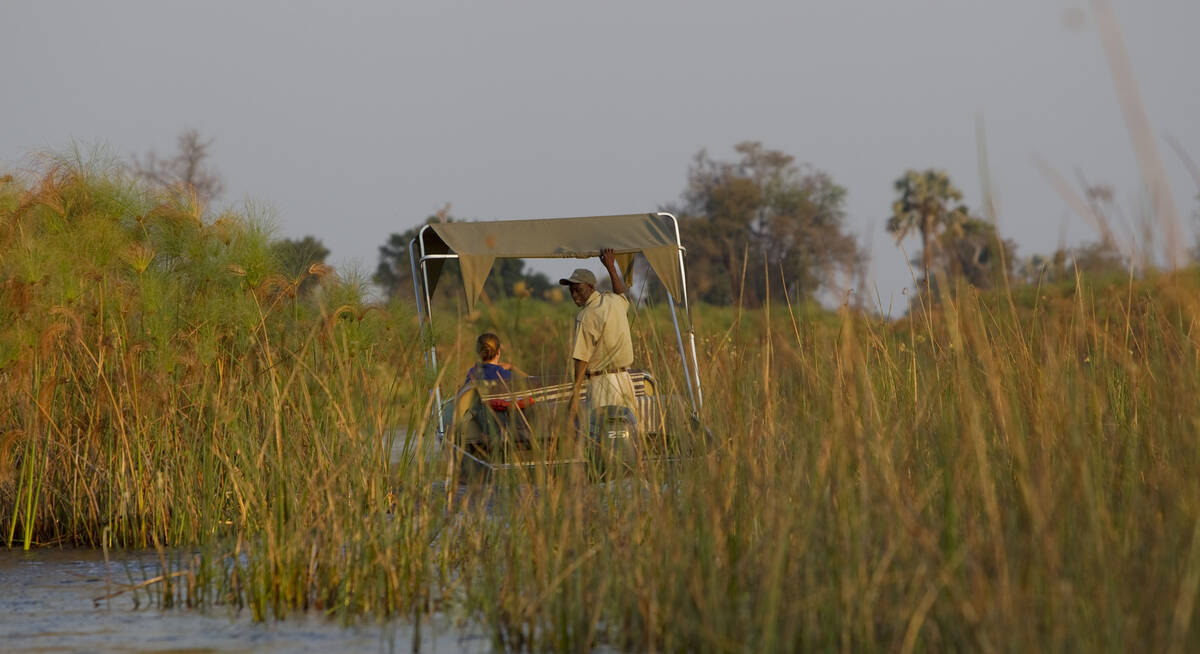
Ground Squirrel Safari
7 days • 2 locations
MAUN AIRPORT TO MAUN AIRPORT
Experiencing the wilderness with an engaging guide whilst staying in a private mobile camp is often the highlight of a safari. Combine that with a charming camp overlooking the Okavango Delta and you’re onto a winner!
US$8,840 - US$11,190 per person
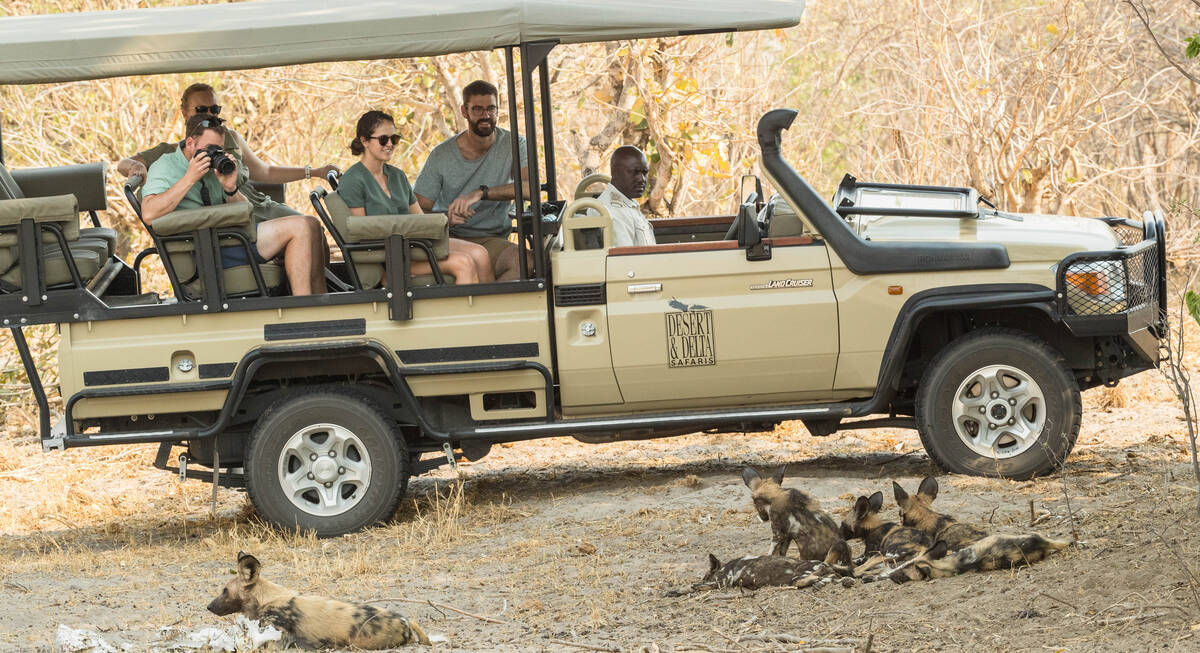
Porcupine Safari
11 days • 4 locations
MAUN AIRPORT TO MAUN AIRPORT
Visit dramatically contrasting landscapes boasting a variety of species during this exploration of Botswana’s top-safari destinations. A combination of national parks and private reserves allows for a range of activities.
US$11,780 - US$16,860 per person
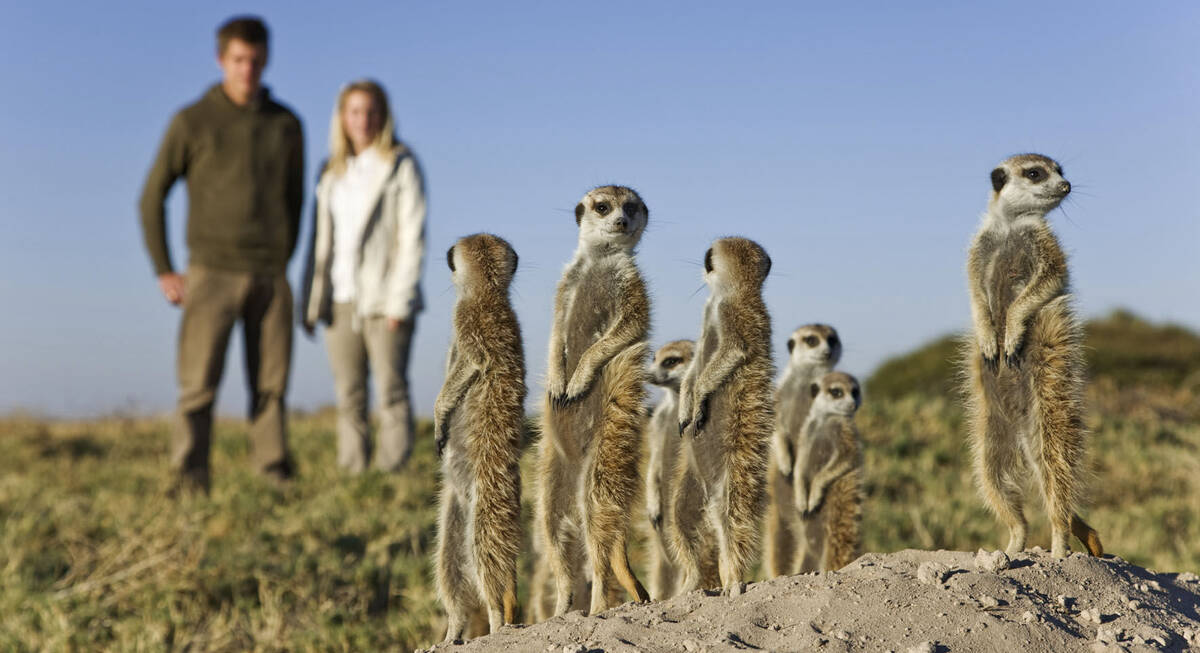
Red Lechwe Safari
9 days • 3 locations
MAUN AIRPORT TO MAUN AIRPORT
Superb guiding from three fabulous camps full of character in three contrasting areas for a fabulous safari to the Okavango Delta and Kalahari Desert.
US$13,300 - US$28,240 per person
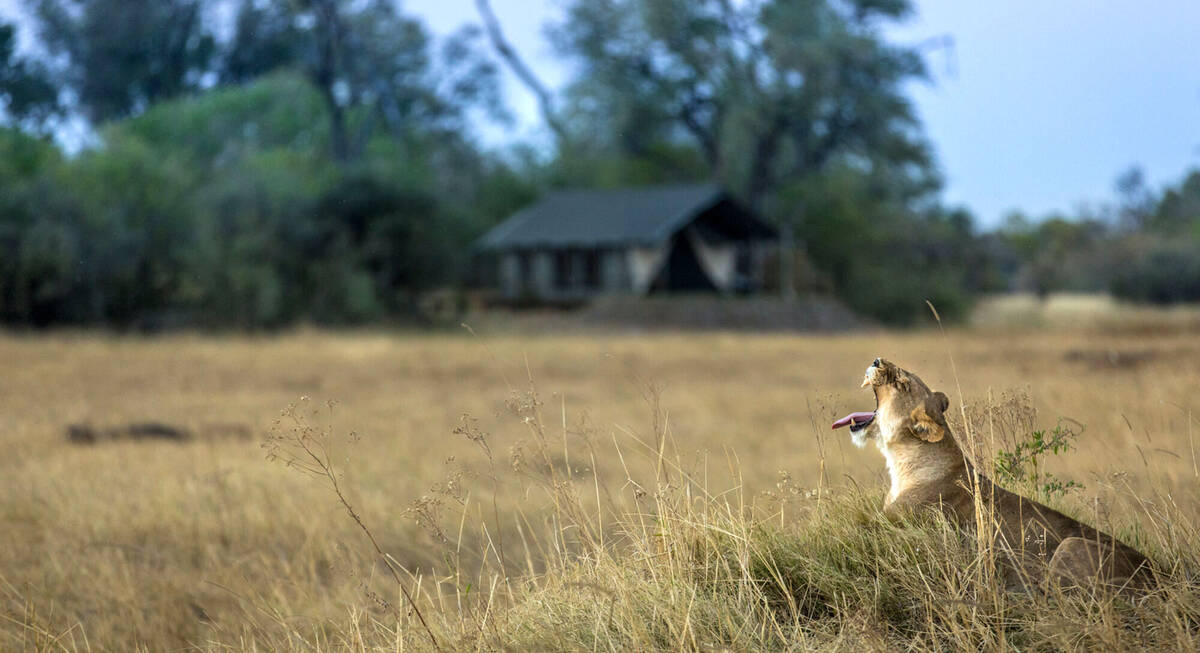
Aardwolf Safari
5 days • 2 locations
MAUN AIRPORT TO MAUN AIRPORT
Two sister-camps within private concessions bordering Moremi Game Reserve offer access to excellent game, varied landscapes and a range of land and water-based safari activities. A great-value safari in one of Botswana’s best wildlife regions.
US$5,500 - US$9,430 per person
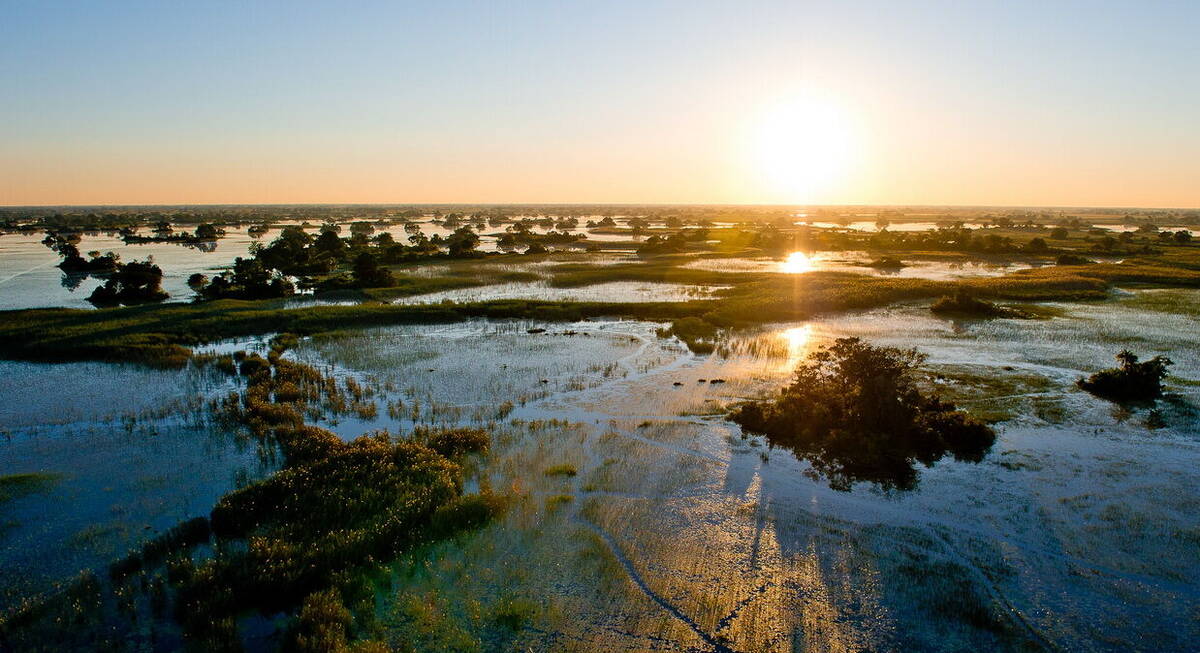
Steenbok Safari
9 days • 3 locations
MAUN AIRPORT TO MAUN AIRPORT
A classic Botswana safari exploring the Moremi, Chobe National Park and Okavango Delta. Excellent wildlife viewing and a variety of activities from three of our favourite traditional tented camps.
US$7,990 - US$13,480 per person
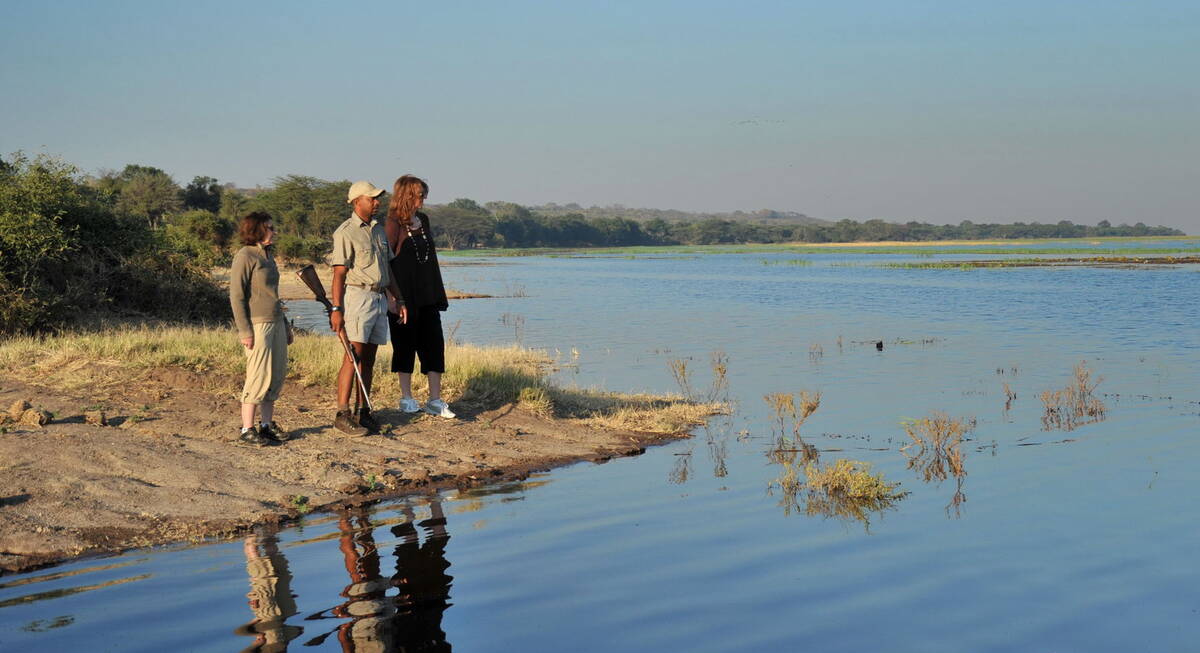
Wild Dog Safari
13 days • 5 locations
KASANE AIRPORT TO MAUN AIRPORT
An in-depth discovery of northern Botswana’s wilderness, from Chobe and the private Kwando Reserve to the Moremi and iconic Okavango Delta with a great variety of activities and wildlife.
US$13,450 - US$21,930 per person
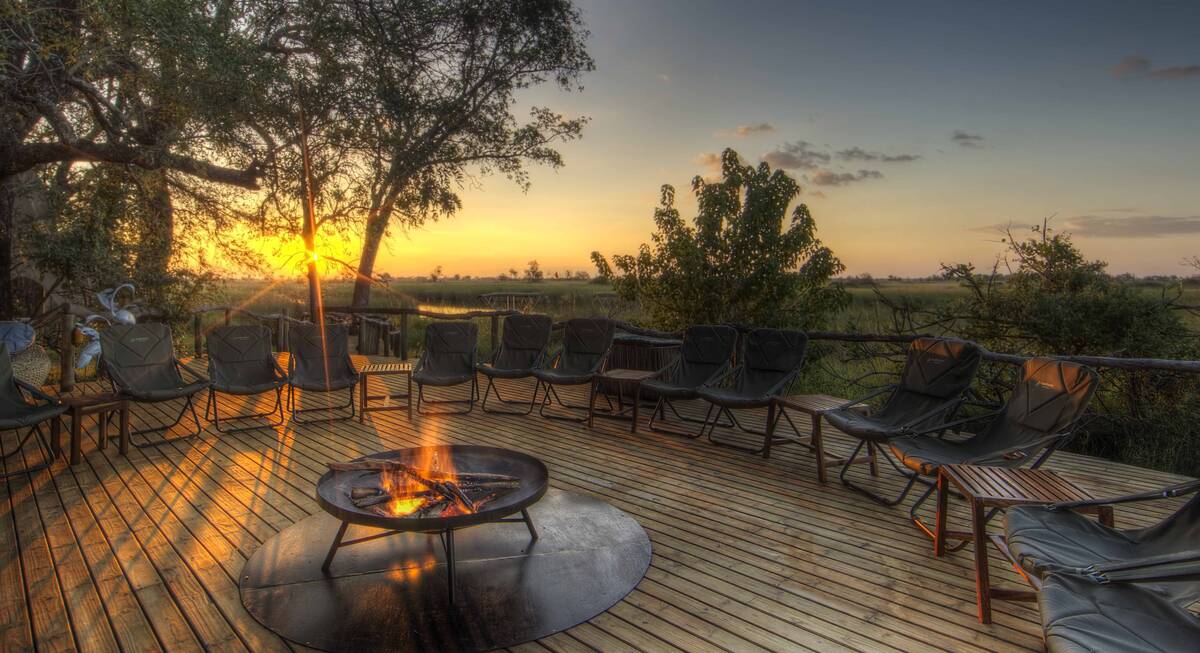
Tsessebe Safari
7 days • 3 locations
MAUN AIRPORT TO MAUN AIRPORT
Visit three sister-camps in and around Moremi Game Reserve during this thorough exploration of the Okavango Delta. A range of activities provide excellent opportunity to observe the local birdlife, mammals and fauna.
US$8,240 - US$11,410 per person
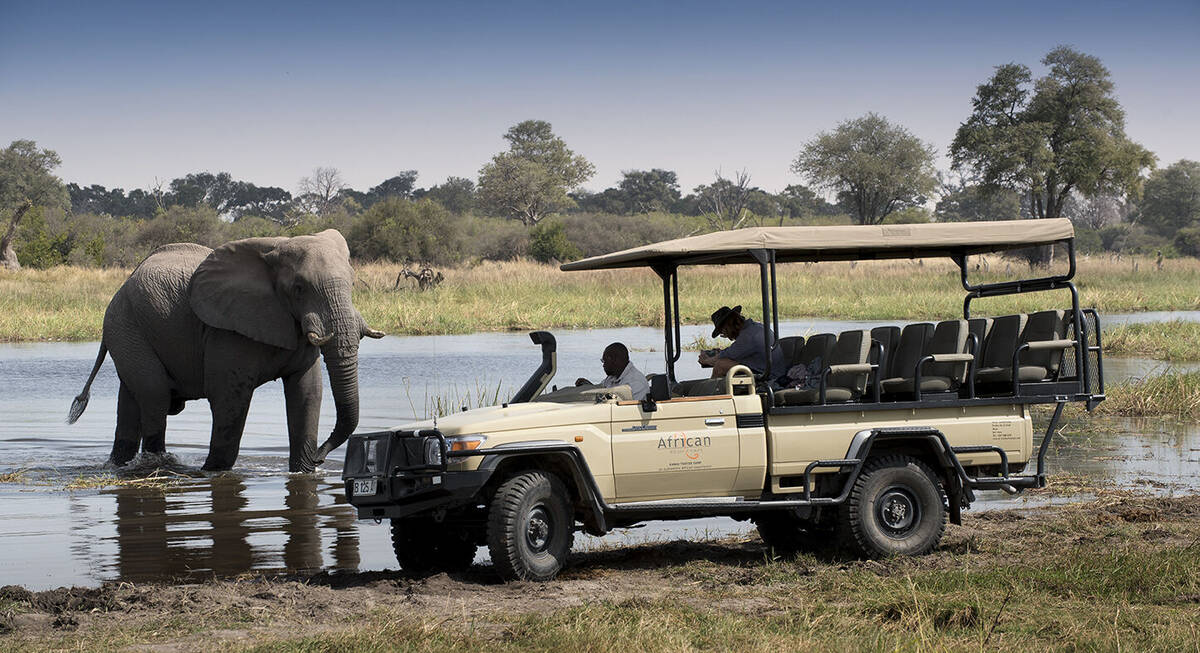
African Jacana Safari
7 days • 3 locations
MAUN AIRPORT TO MAUN AIRPORT
An adventurous introduction to Botswana blending prolific wildlife, incredible landscapes and varied activities staying at relaxed camps in the Chobe Enclave, a community-owned reserve bordering the Moremi, and Makgadikgadi Pans.
US$8,550 - US$12,280 per person
Most recent reviews of our safaris to Moremi
Click below for 299 reviews of camps in & around Moremi. All from our travellers; all are in full & unedited.
Arrived 11 Oct 2024, 12 nights
"My Oct 2024 trip"
Overall rating: Excellent
Arrived 19 Jun 2024, 11 nights
"June 2024 Botswana"
Overall rating: Excellent
Arrived 11 Oct 2024, 12 nights
"My Oct 2024 trip"
Overall rating: Excellent
Arrived 24 Jun 2024, 11 nights
"My Jun 2024 trip"
Overall rating: Excellent
Arrived 22 Sep 2022, 16 nights
"My Sep 2022 trip"
Overall rating: Excellent
Arrived 13 Sep 2024, 15 nights
"My Sep 2024 trip"
Overall rating: Excellent
Arrived 28 Oct 2017, 15 nights
"We saw almost everything!"
Overall rating: Excellent
Arrived 7 Sep 2024, 14 nights
"Botswana 2024"
Overall rating: Excellent
Arrived 27 Aug 2024, 13 nights
"My Aug 2024 trip"
Overall rating: Excellent
Arrived 31 May 2024, 9 nights
"My May 2024 trip"
Overall rating: Excellent
Where to stay in Moremi
Our suggestions for safari camps in Moremi Game Reserve
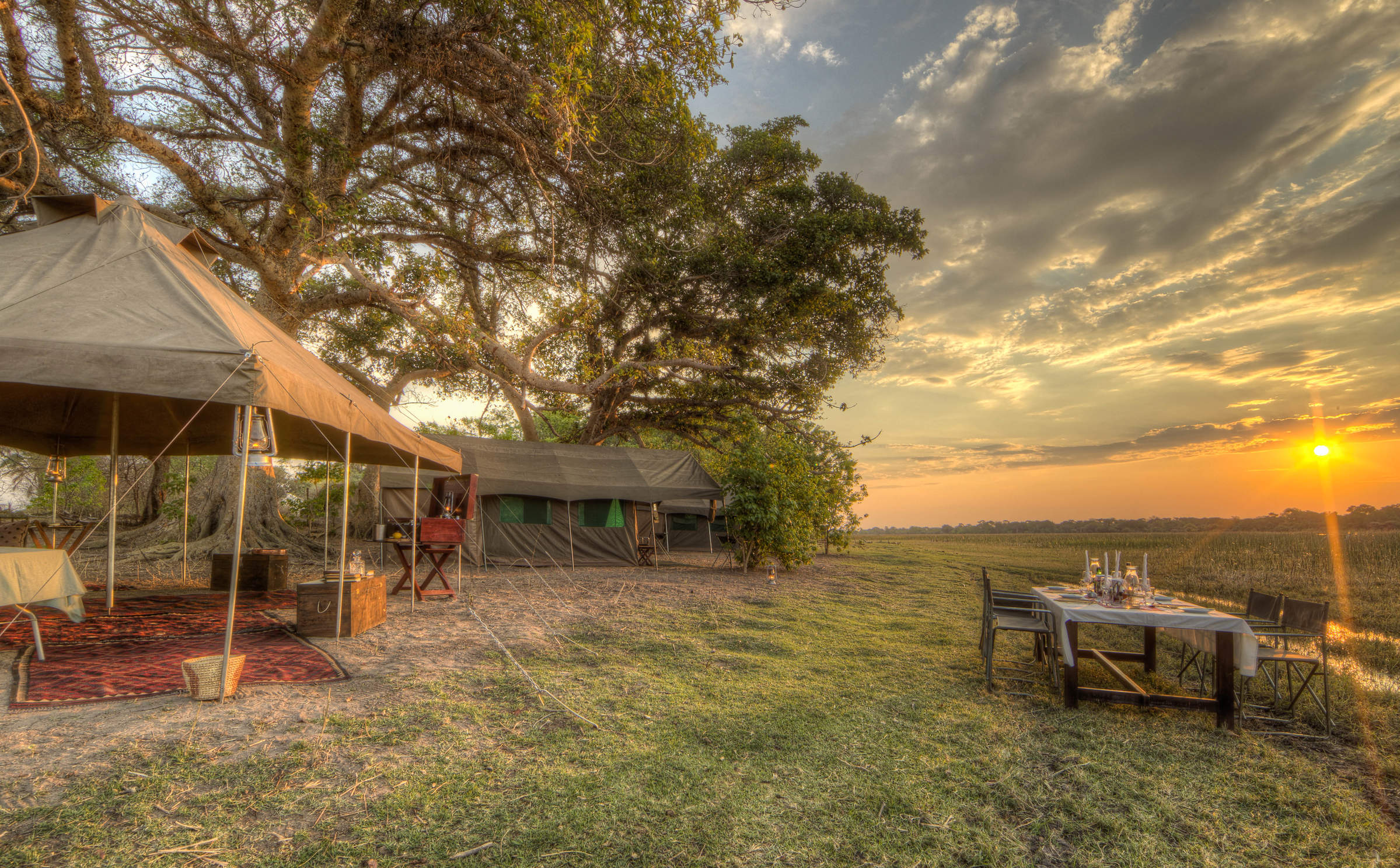
Private Mobile
The Botswana Private Mobile Safari has no fixed location; it's exclusive to your group and comes with a top professional guide. Expect comfortable camping, great food, and a superb wildlife experience wherever you decide to go.
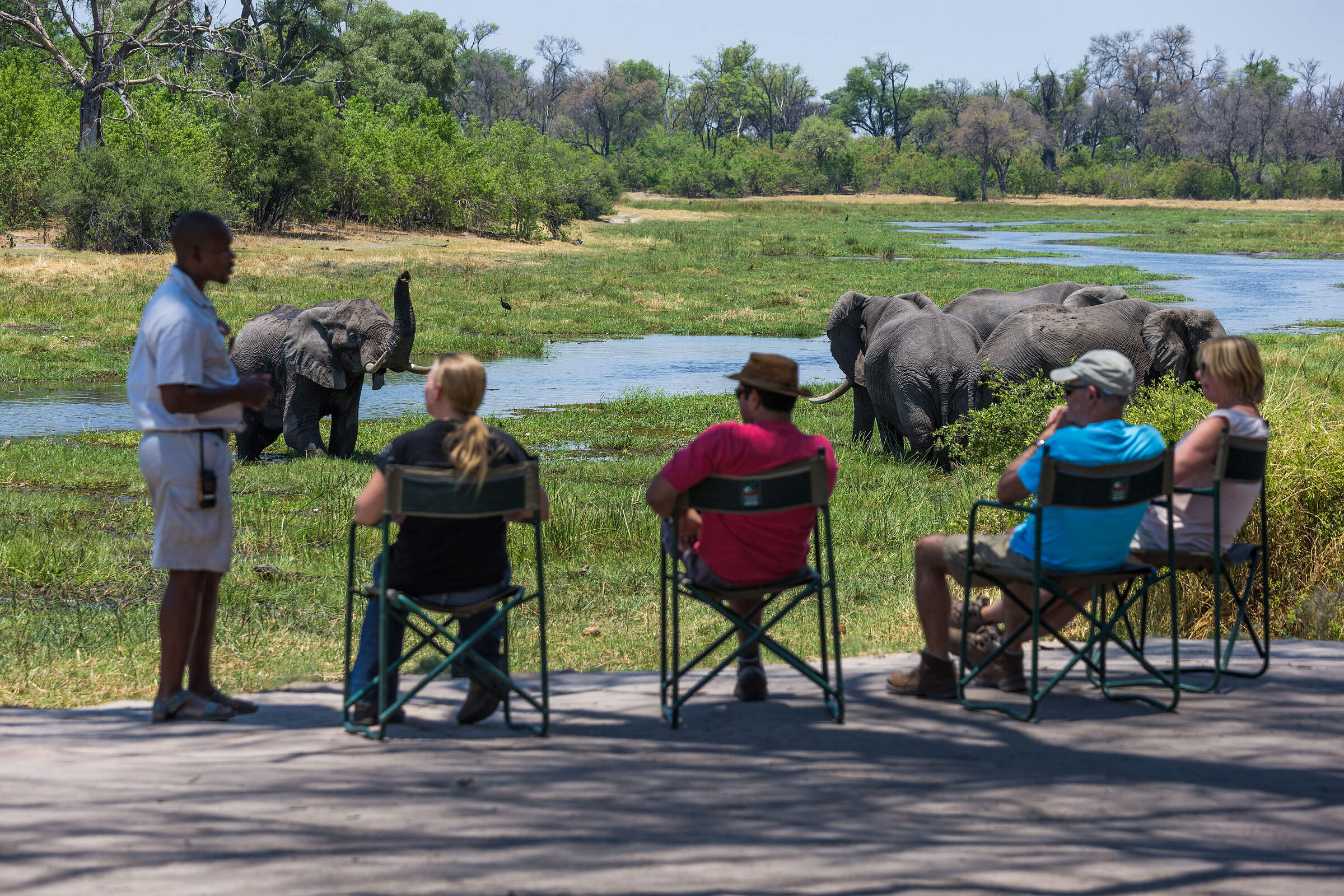
Machaba Camp
Overlooking the Khwai River to Moremi Game Reserve beyond, the classic Machaba Camp combines comfort with excellent game viewing.
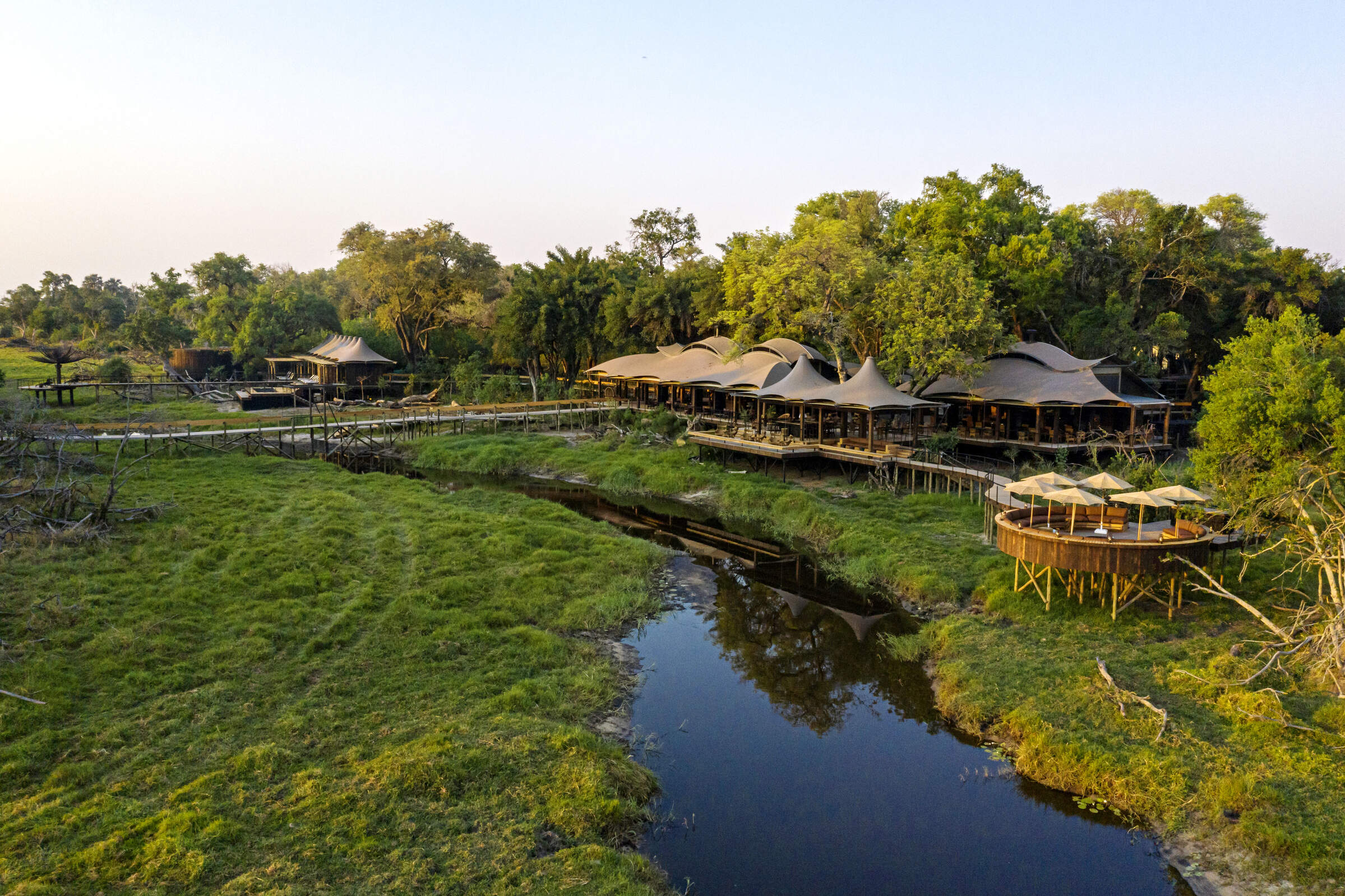
Xigera Safari Lodge
Located deep in Botswana's Okavango Delta, Xigera Camp normally focuses on mokoro excursions and motorboat trips, with 4WD game drives when water levels permit.
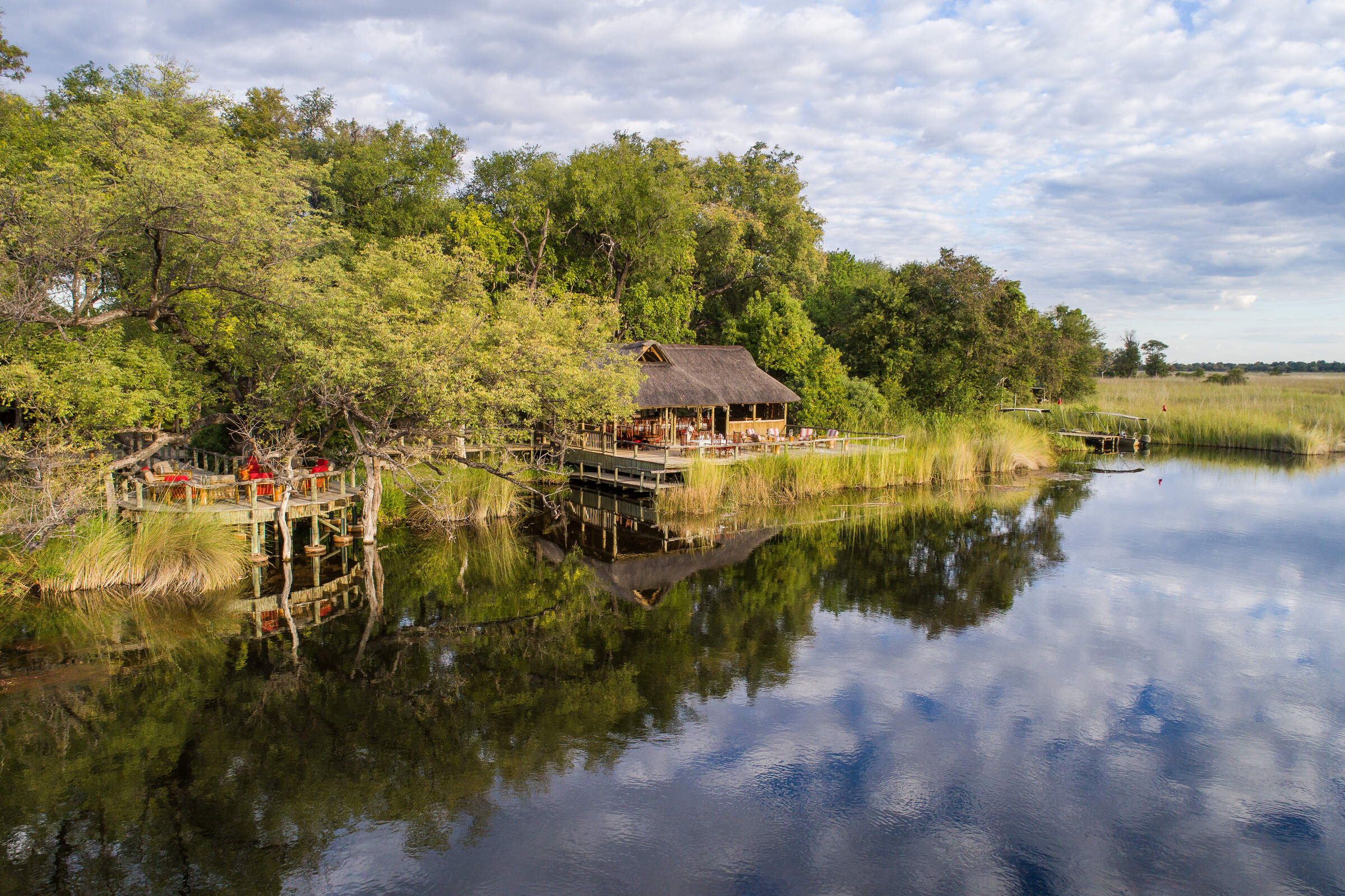
Xakanaxa
Camp Xakanaxa is a well-established traditional camp beside a huge lagoon within the Moremi Game Reserve, with access to some superb wildlife viewing.
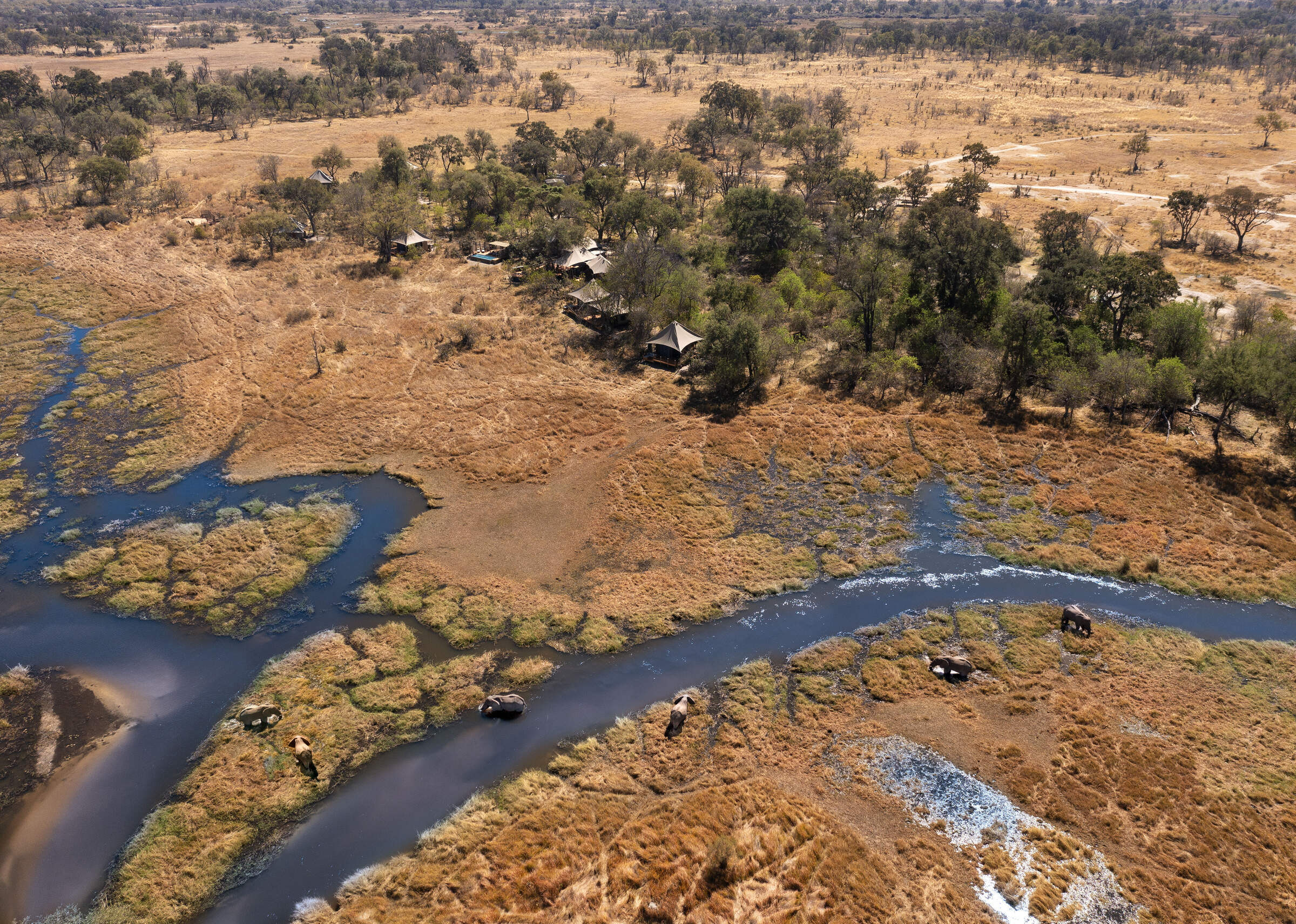
Khwai Lediba
Khwai Lediba offers a traditional African safari experience, with very comfortable tented accommodation, in a fantastic game area north of the Moremi Game Reserve.
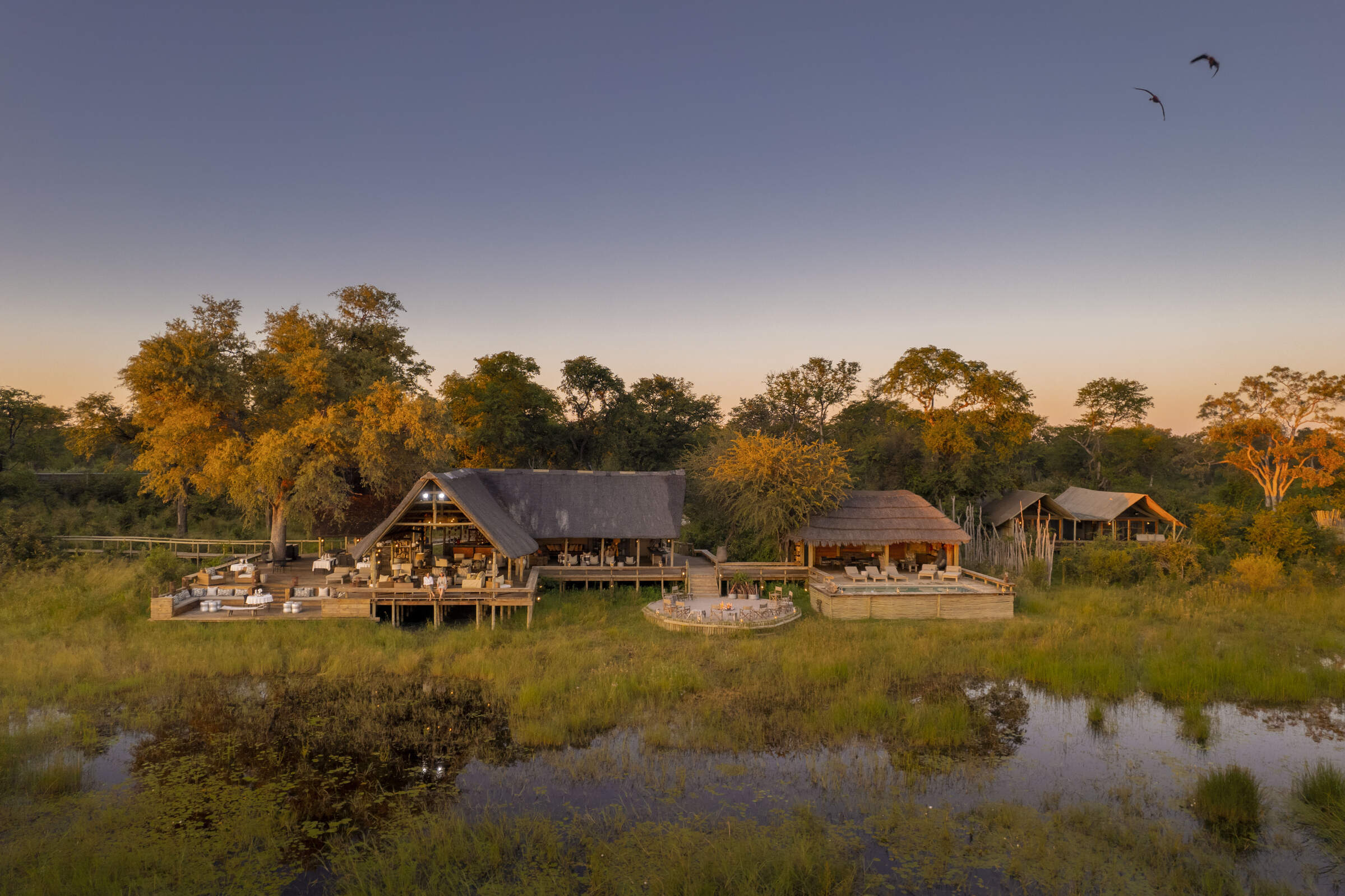
Sable Alley
Smart, independent and well-run, Sable Alley overlooks a beautiful, hippo-filled lagoon within the diverse Khwai Private Reserve.
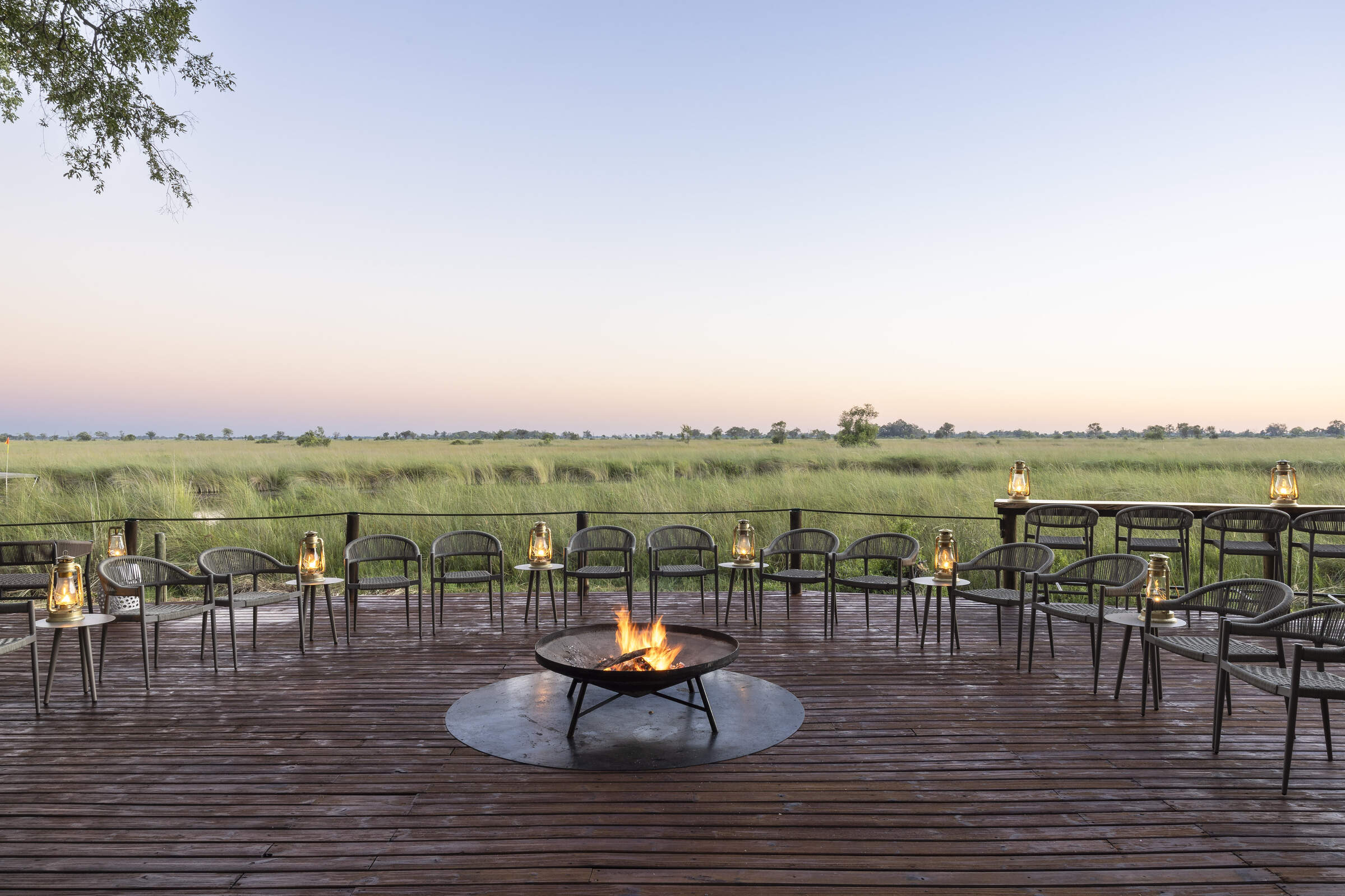
Okuti
With an innovative design and good service, Okuti Camp offers game drives and boat trips in a beautiful, game-rich part of Moremi Game Reserve.
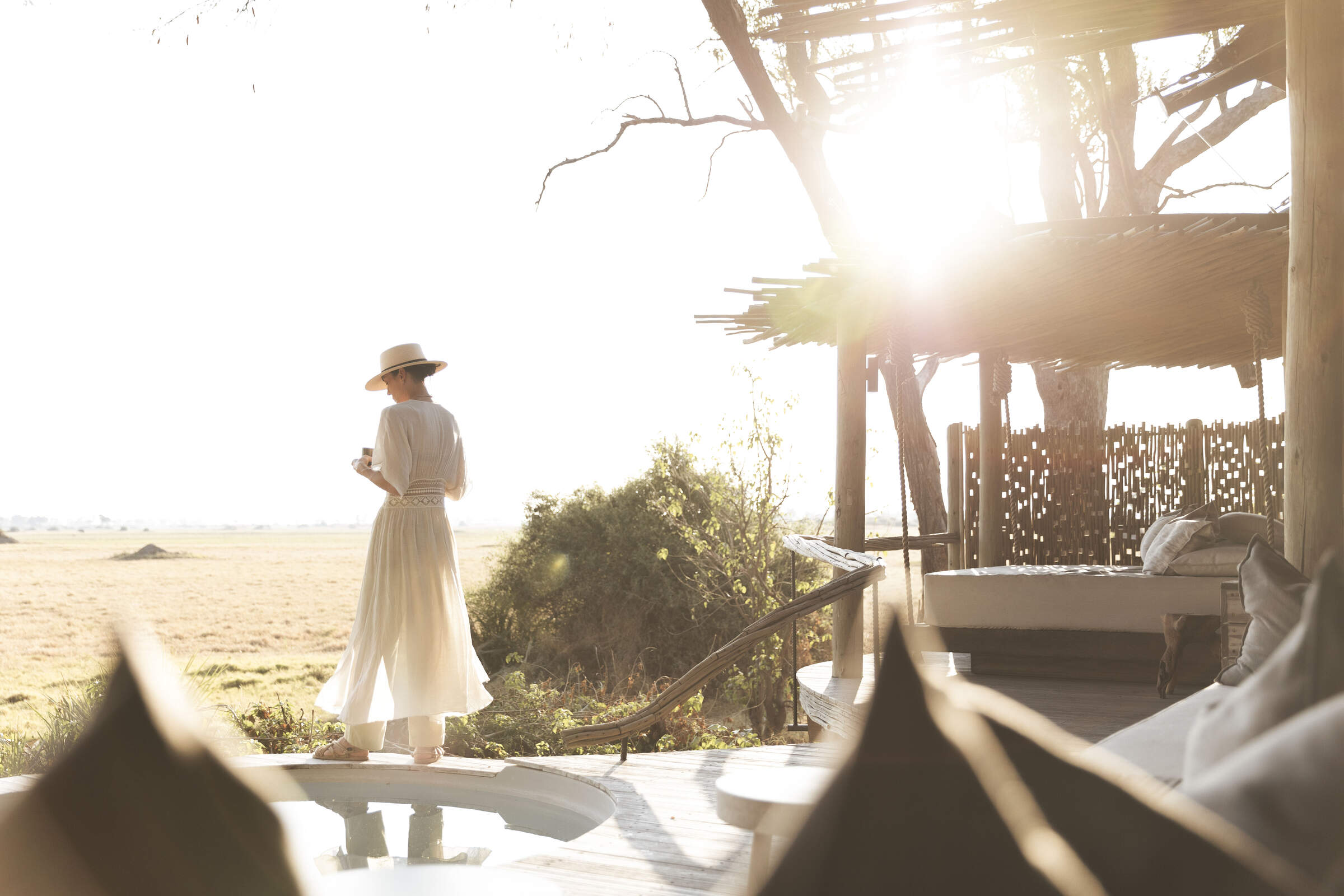
Mombo Camp
Mombo is one of Botswana's most exclusive safari camps, set in a beautiful, remote location within the Moremi Game Reserve and with exceptional game densities.
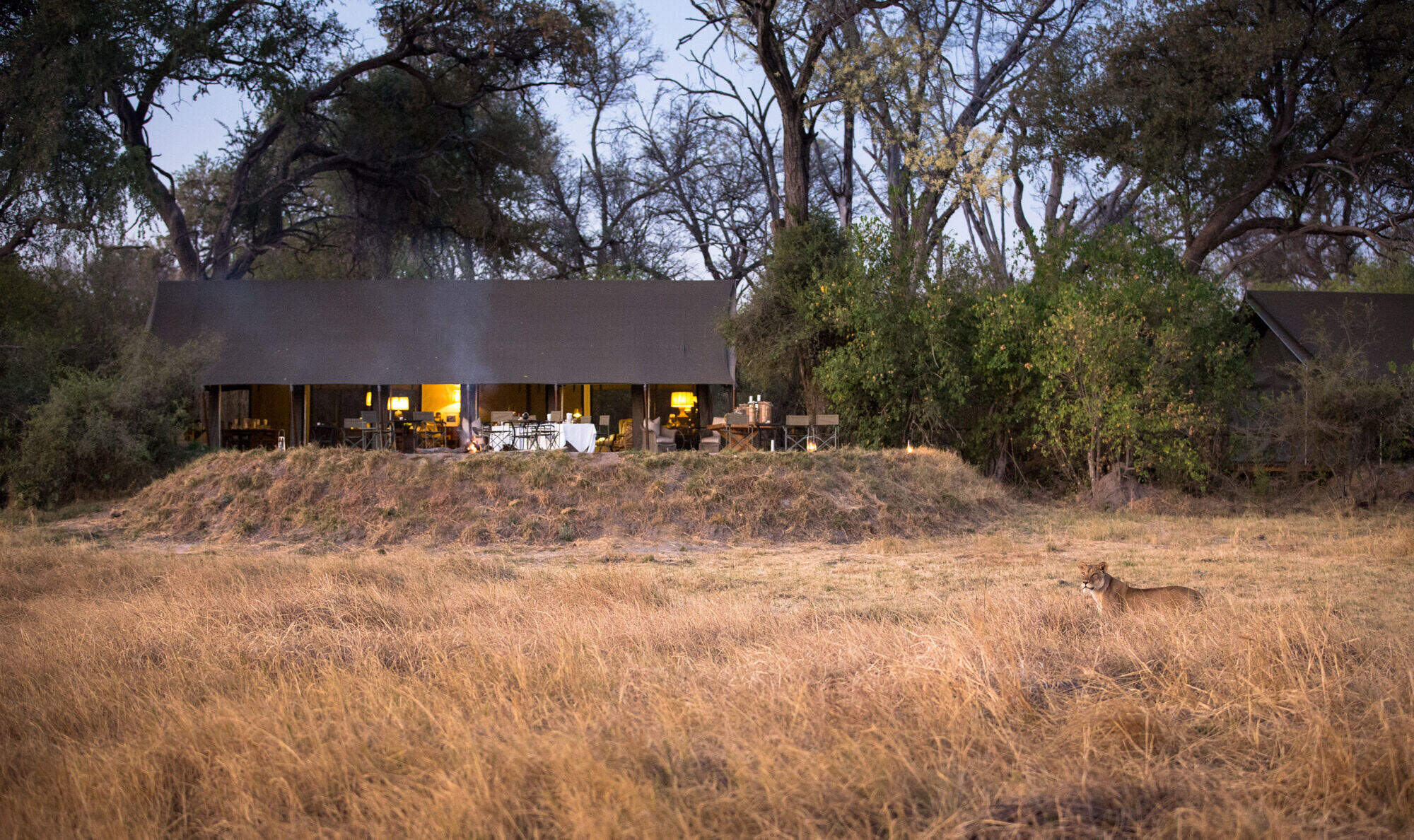
Little Machaba
Overlooking the Khwai River and Moremi Game Reserve beyond, Little Machaba is a classically designed camp with very comfortable tents in a great game-viewing area.
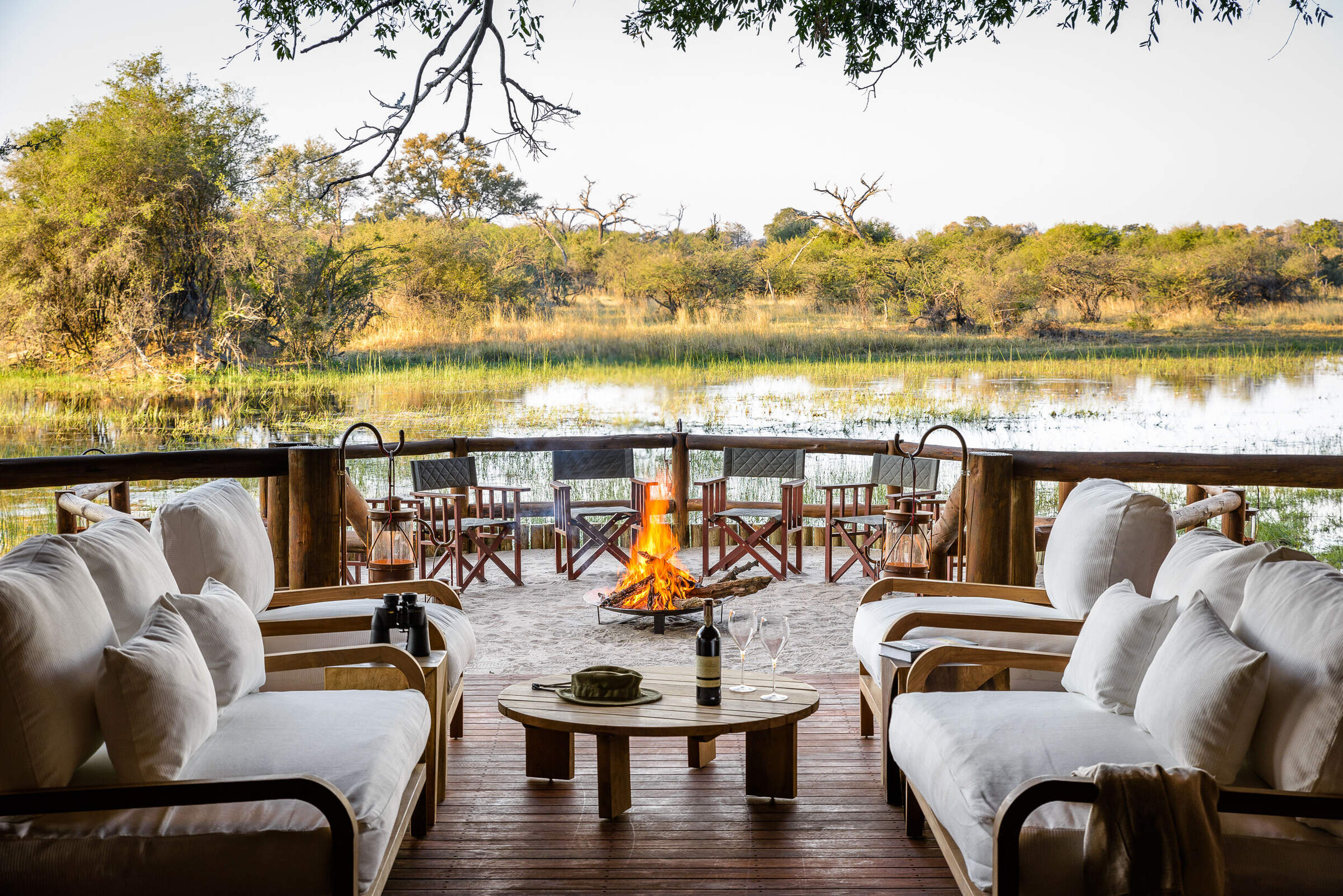
Chief's Camp
Chief's Camp is situated on Chief's Island, within the Okavango Delta's Moremi Game Reserve. Experience one of Botswana's top game-viewing areas by 4WD and mokoro.
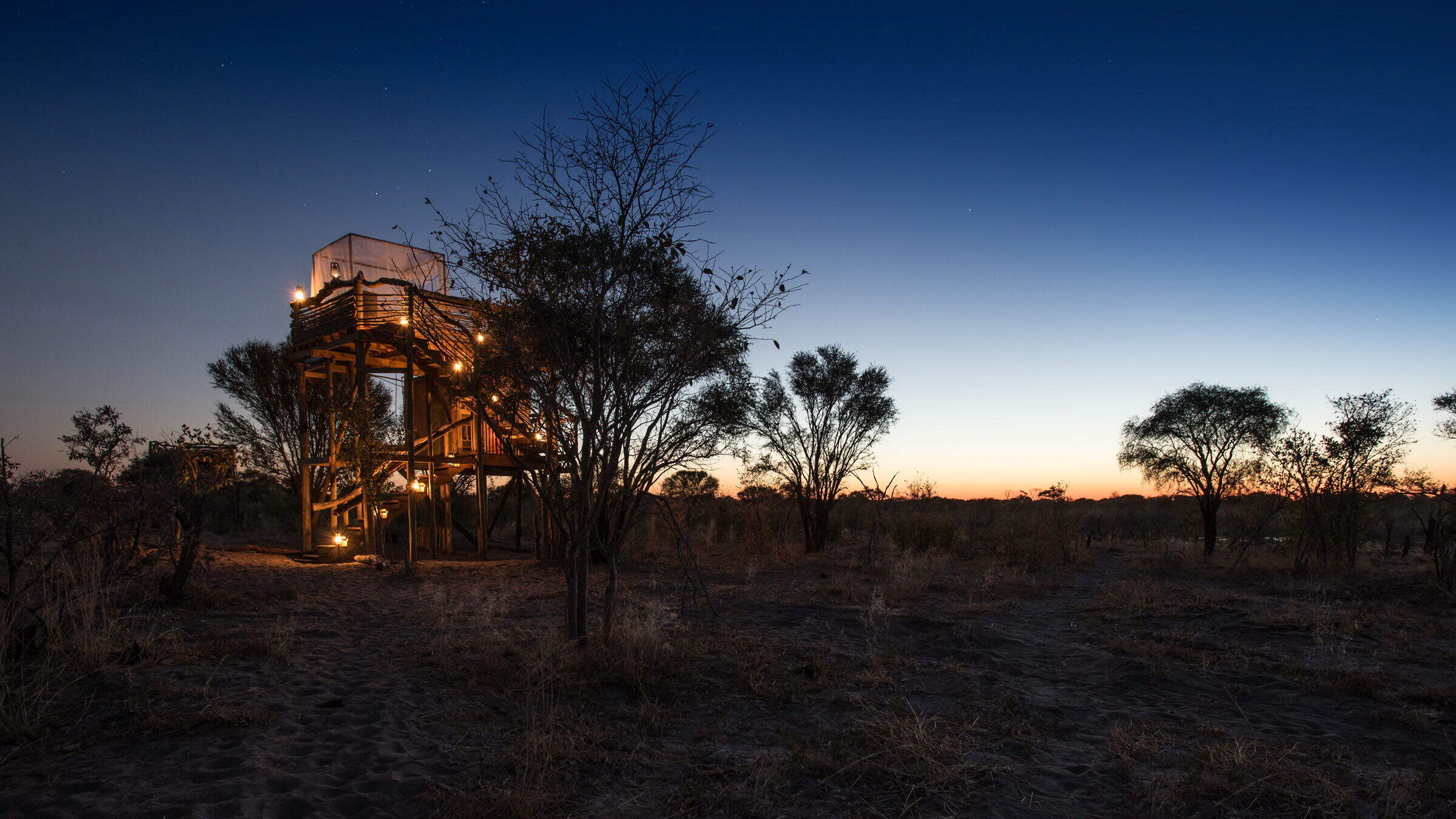
Skybeds
Situated in a private reserve close to Moremi Game Reserve, Skybeds offers a simple yet wonderful opportunity to sleep under the stars and watch wildlife from your bed.
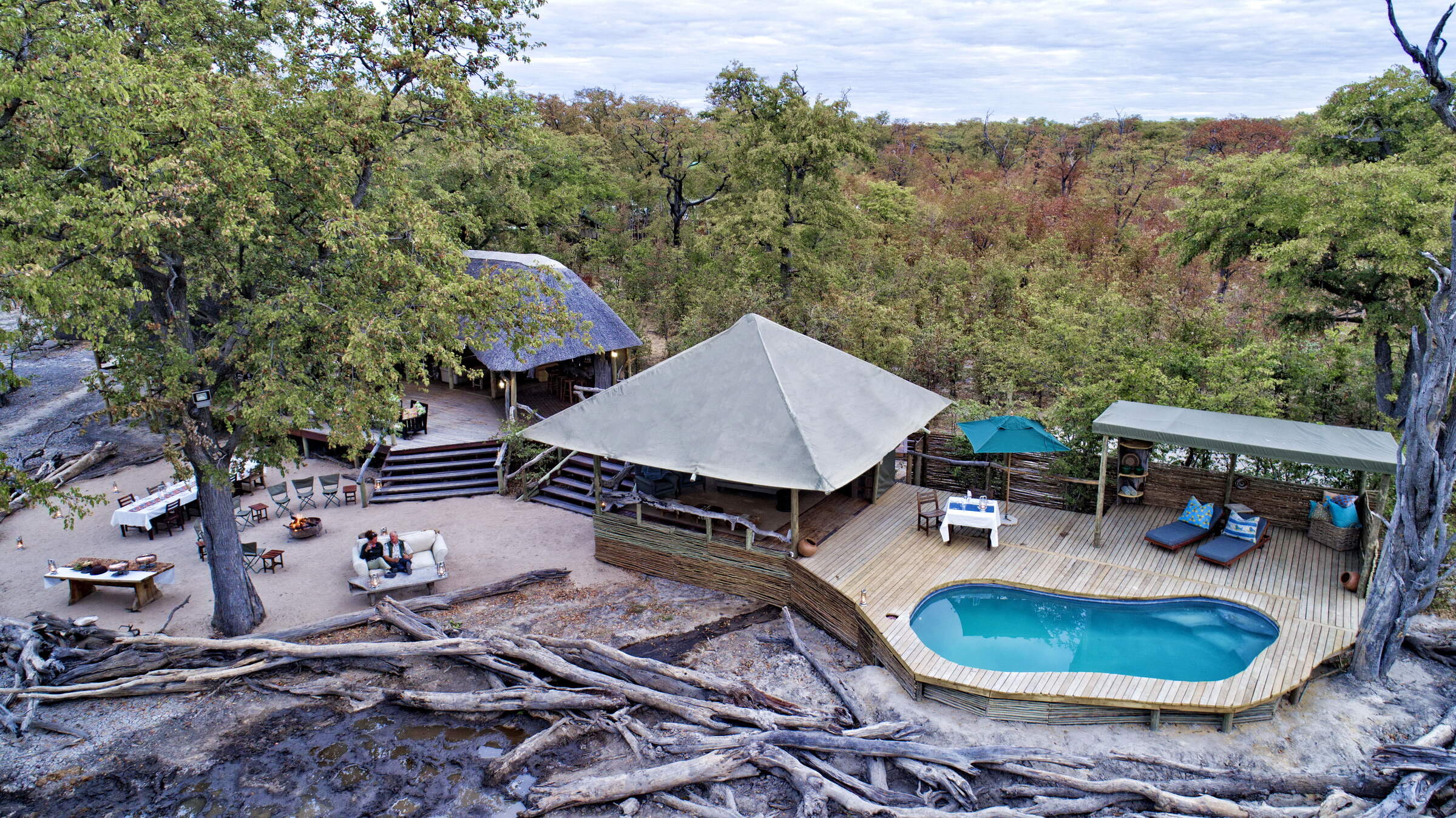
Hyena Pan
Fairly rustic, and relatively inexpensive, Hyena Pan overlooks a natural waterhole that attracts an almost constant parade of animals.
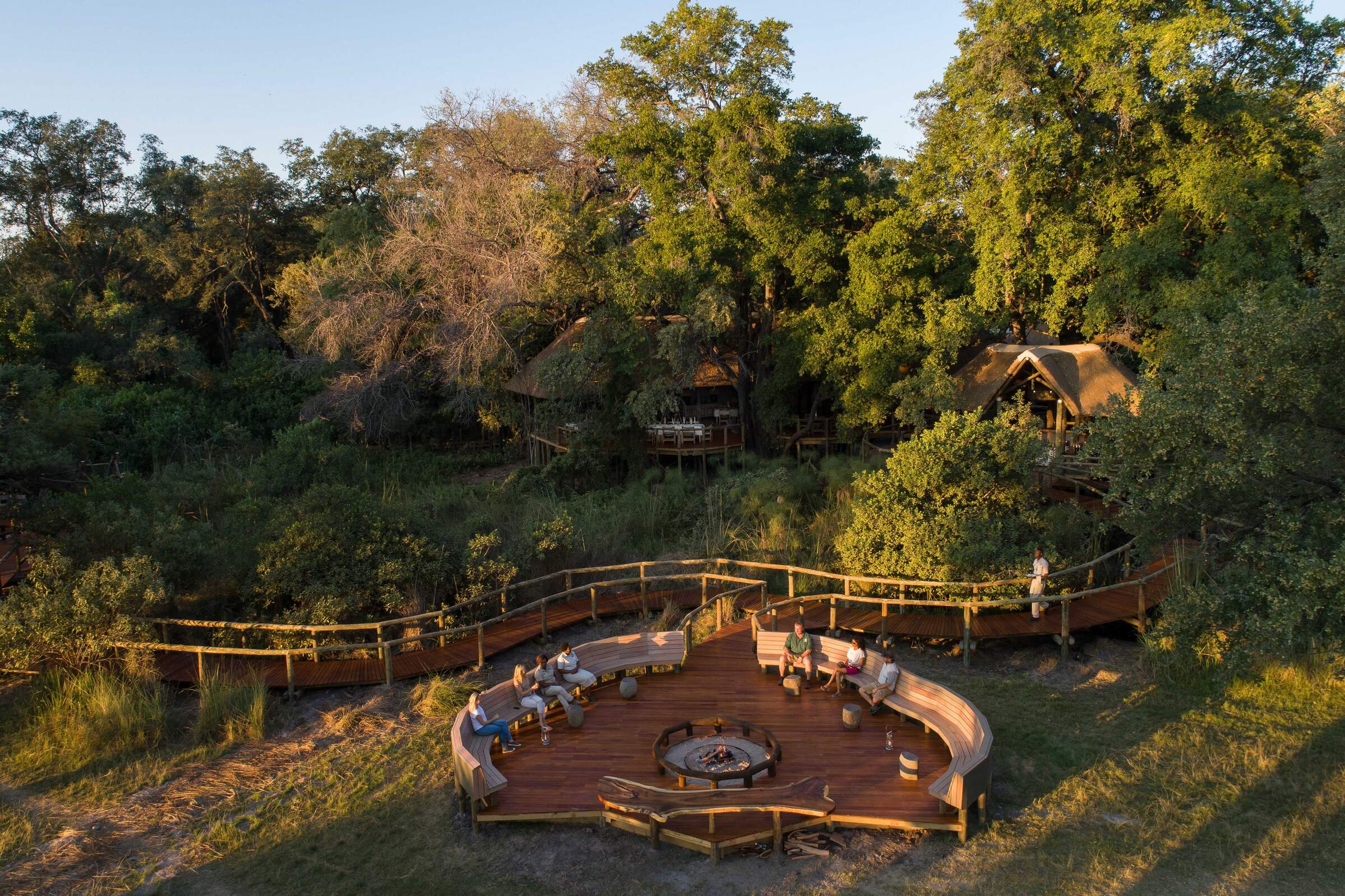
Camp Moremi
In one of the best locations for game viewing in Botswana, Camp Moremi sits at the tip of the Mopane Tongue, overlooking Xakanaxa Lagoon.
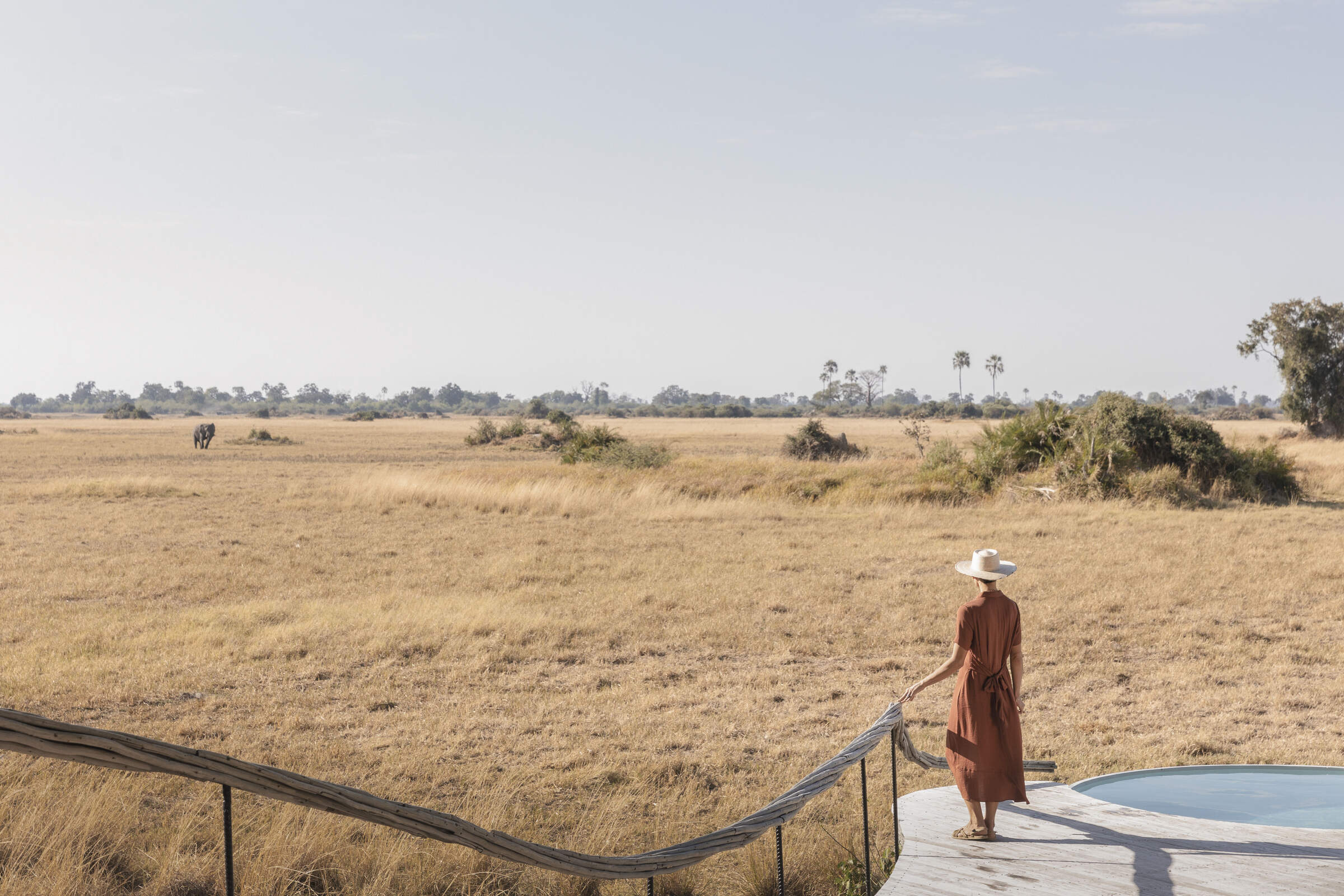
Little Mombo
One of Botswana's top safari camps, Little Mombo stands on the north side of Chief's Island, in the heart of the Okavango Delta's Moremi Game Reserve.
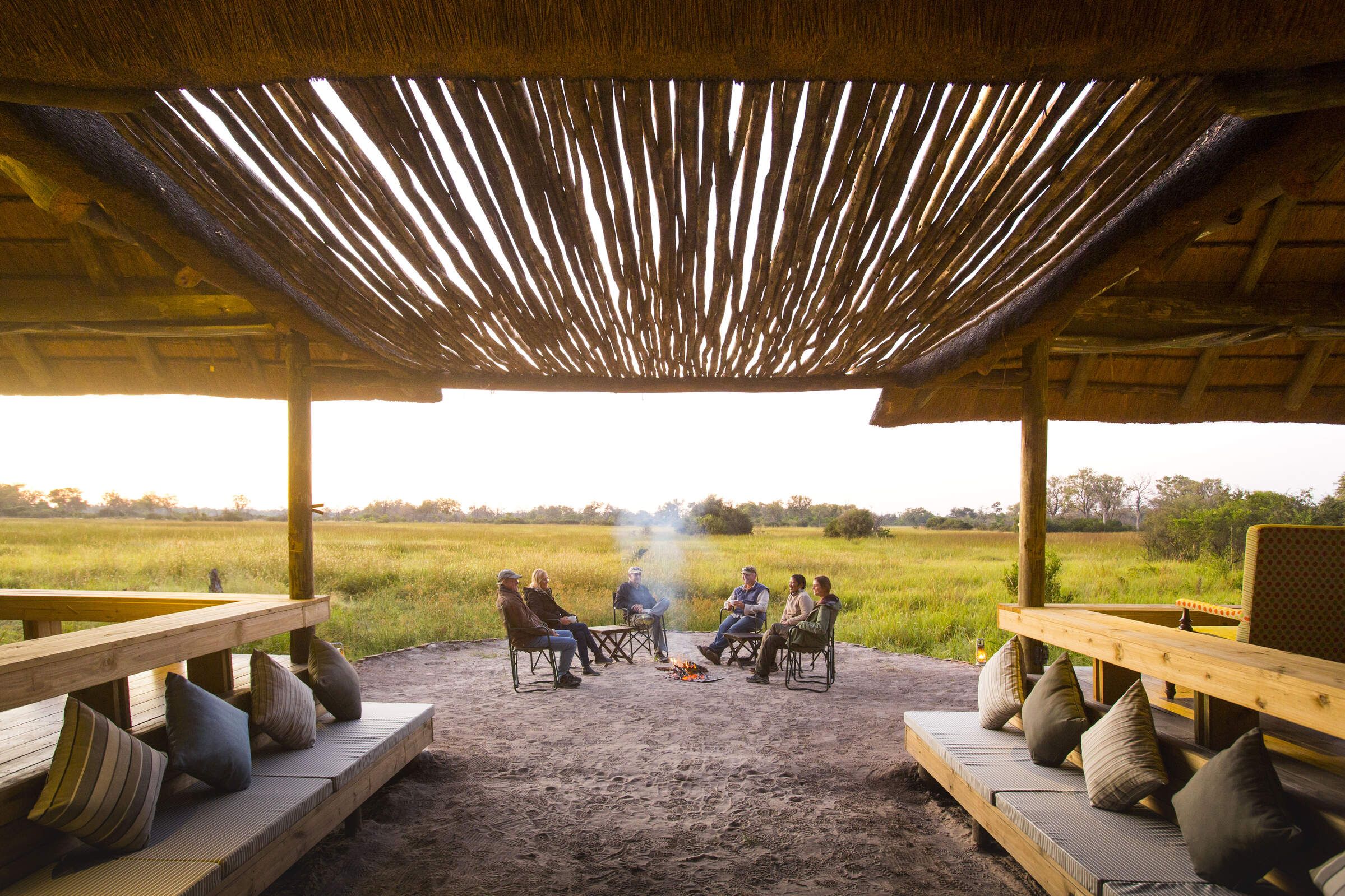
Little Sable
Little Sable camp is located in the Khwai Private Reserve – which borders the Moremi Game Reserve and Chobe

Tuludi
Tuludi is a brand new luxury camp, within the Khwai Private Reserve, built on a site under giant leadwood trees and overlooking the Okavango Delta floodplains.
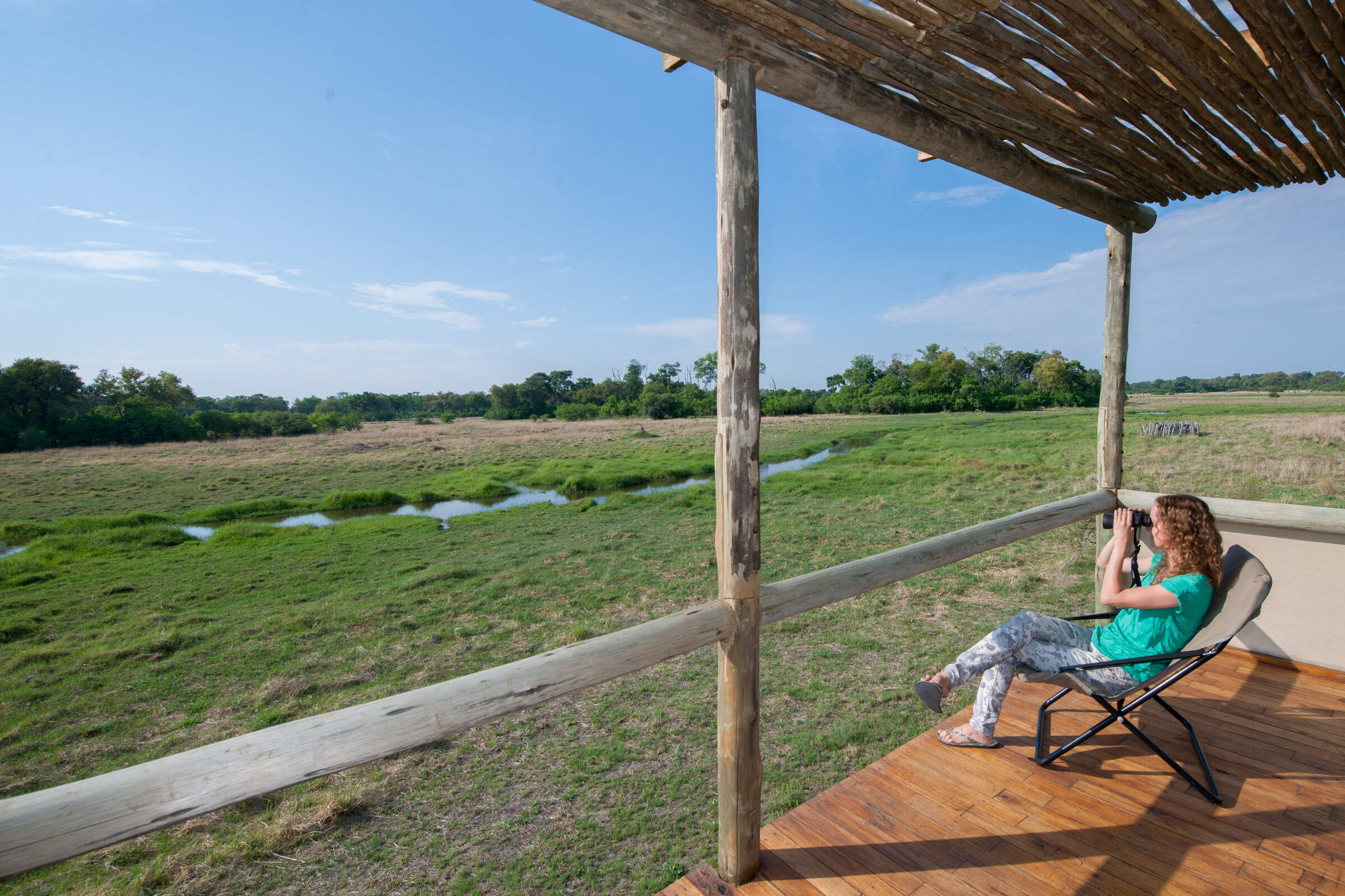
Sango Safari Camp
Sango offers comfortable tented accommodation, without some of the frills often found in Botswana's camps, with an area that's scenic and gets excellent, consistent game sightings.
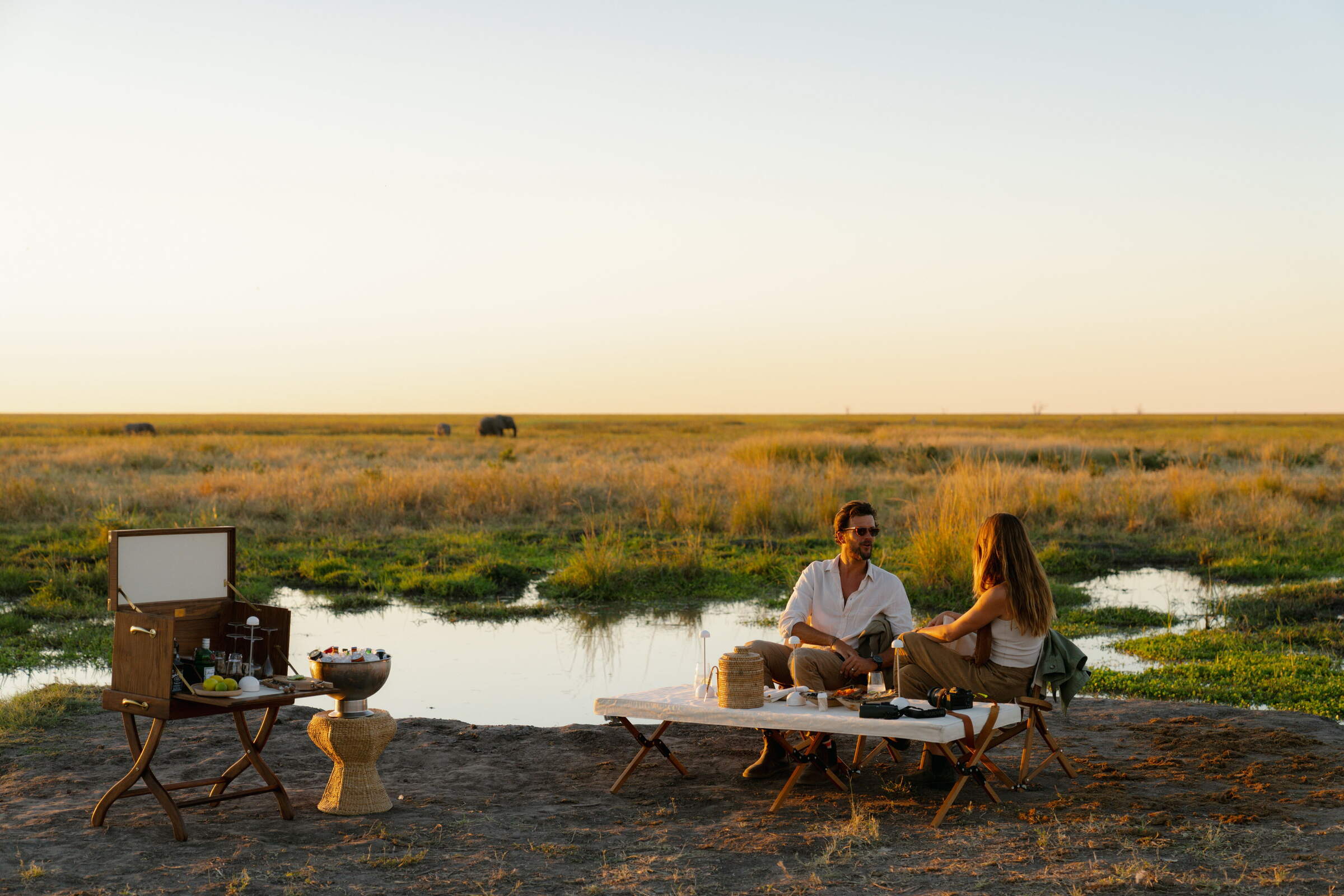
Mokete Camp
New for July 2023, Mokete has 9 luxurious tents, raised on platforms above the surrounding bush and offers an experience of the Kalahari Wilderness.
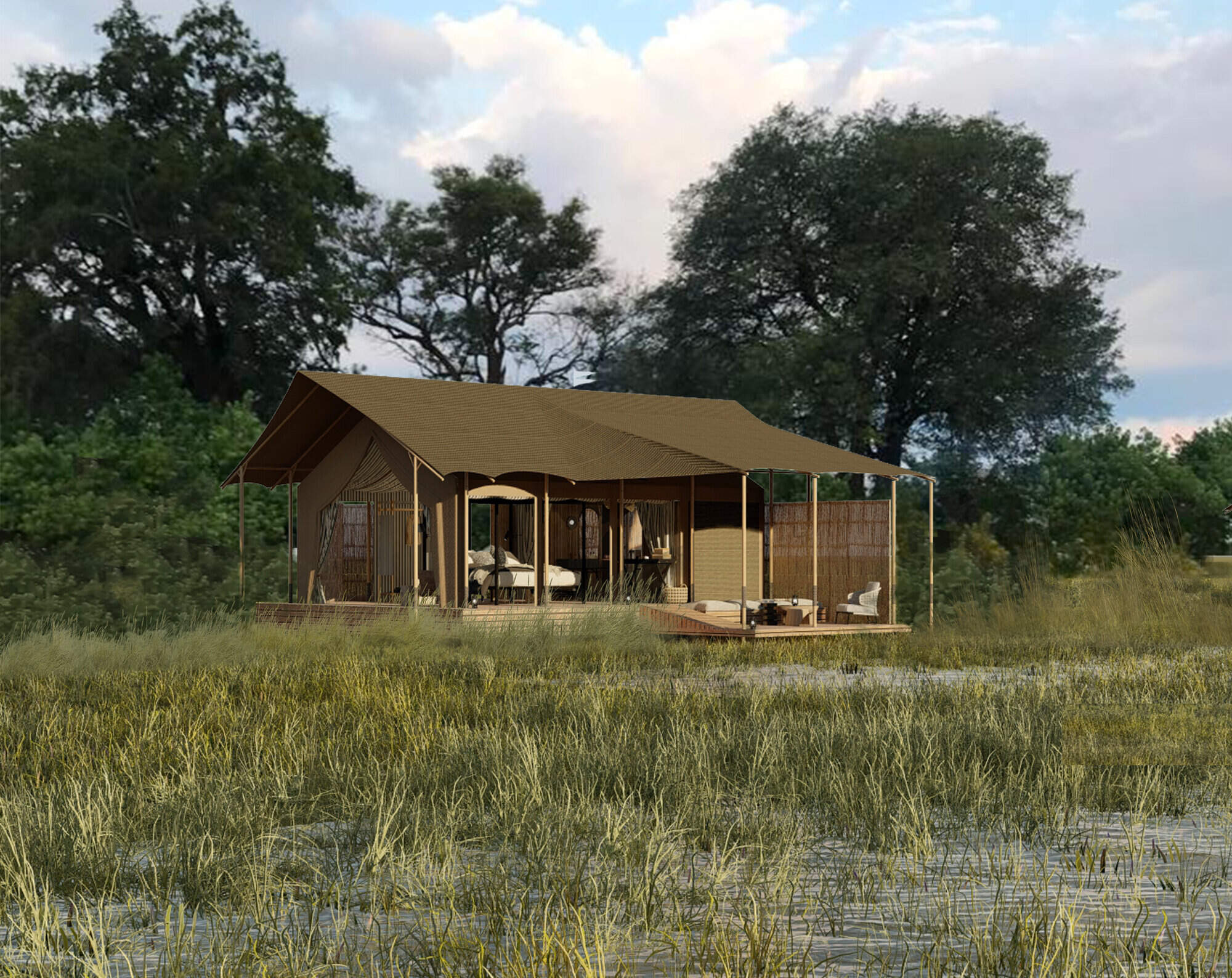
Monachira
A new lodge in Moremi Game Reserve, with a focus on water-based activities, the family-friendly Monachira will be opening in May 2025.

Khwai River Lodge
Khwai River Lodge is a luxurious and well-equipped safari camp, on the northern edge of Moremi Game Reserve. This area isn't exclusive, but it is beautiful and has excellent game.

Khwai Leadwood
Khwai Leadwood is a luxurious lodge located in the heart of the Khwai Community Concession, offering guests exceptional service, stunning scenery, and unforgettable wildlife experiences.
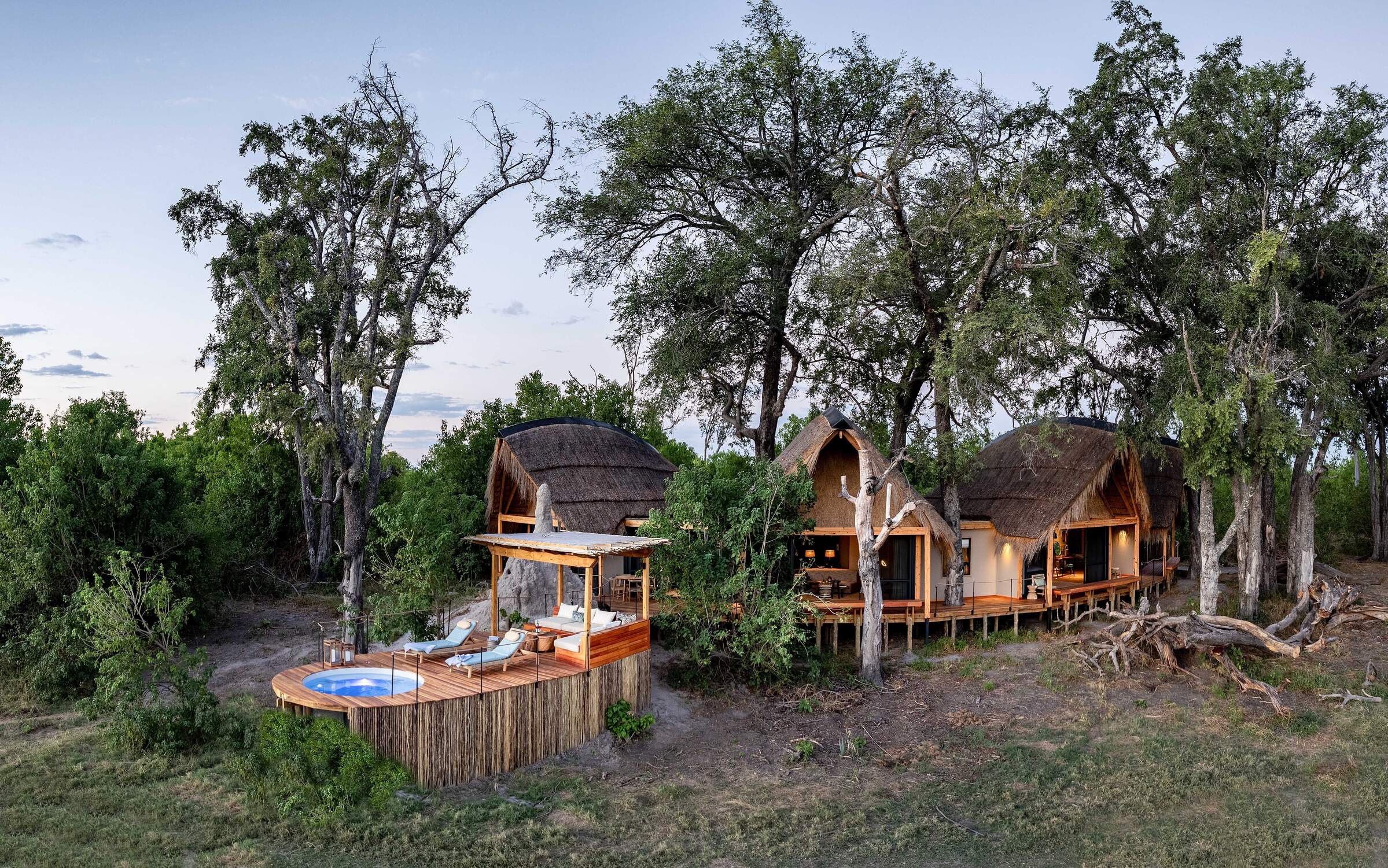
Tawana
An exclusive new lodge on the banks of the Gomoti River, Tawana has just eight very spacious suites.
Our travellers’ wildlife sightings in Moremi
This is their success for sightings in Moremi Game Reserve. Click on a species for more detail. How we work this out.

98% success

95% success

95% success

94% success

92% success

84% success

81% success

79% success

75% success

63% success

35% success

32% success

30% success

17% success

12% success

4% success

3% success

2% success

0% success
When to go to Moremi Game Reserve
Moremi Game Reserve has two distinct seasons.
The dry season (May to October) offers cooler temperatures, clear skies, and excellent game viewing as wildlife congregates around dwindling water sources, particularly near the Khwai River and Xakanaxa Lagoon. This is the prime time to spot large predators and herds of elephants and buffalo.
The wet season (November to April) brings warmer temperatures and occasional thunderstorms, transforming the landscape into a lush, green paradise. While wildlife can be harder to spot due to dispersed animals and thicker vegetation, birdwatching is exceptional with many migratory species. Water-based safaris, including mokoro excursions, are highlights during this season in Moremi.
Jan
Feb
Mar
Apr
May
Jun
Jul
Aug
Sep
Oct
Nov
Dec
Moremi Game Reserve in January
January is the height of the rainy season in Moremi Game Reserve. Evening showers and occasional thunderstorms cool the air, making temperatures more comfortable than the peak heat of October to December. Wildlife disperses across the landscape, but the Khwai River area still offers good sightings of lions and elephants.
January is also an exceptional time for birdwatching, with migratory species abundant and breeding activity in full swing. The lush greenery creates stunning photographic opportunities, while mokoro excursions allow for tranquil exploration of waterways. Despite the rain, Moremi’s diverse ecosystems, including mopane forests and waterways, offer unique wildlife viewing opportunities. Lower visitor numbers mean better rates at camps and lodges.
- Warm with occasional heavy thunderstorms
- Spectacular birdlife throughout the reserve
- Wildlife dispersed in the floodplains and woodlands
- Good availability in camps and lodges
Our view
A good time to visit, with pros & cons
Weather in January
Moremi Game Reserve in February
February in Moremi Game Reserve sees the wet season continue, with heavy evening rains and cooling temperatures. The reserve is green and vibrant, alive with insects, smaller animals, and many animals are raising their young. The Xakanaxa Lagoon area is particularly rich in wildlife diversity at this time.
While thicker vegetation makes spotting larger animals more challenging, patient observers may encounter leopards or antelope species. Birdwatching remains a highlight, with over 500 species, including many in colourful breeding plumage. High water levels make boat trips a wonderful way to explore the intricate waterways of the Delta. Visitor numbers are low, offering a more intimate safari experience and better availability at luxury camps.
- Warm temperatures with some thunderstorms
- Abundant birdlife, including breeding species
- Wildlife raising young across the reserve
- Game viewing improving in central areas
- Low visitor numbers and good camp availability
Our view
This is not a great time to visit
Weather in February
Moremi Game Reserve in March
March marks the end of the rainy season, with fewer storms and more sunny days. The landscape remains lush, and wildlife activity increases as animals finish raising their young. This is an ideal time for photography, with the green scenery providing dramatic backdrops.
While thick vegetation can still make wildlife spotting challenging, patient observers may be rewarded with sightings of predators like lions and leopards, especially in the Khwai River area. Birdwatching continues to be exceptional, with many migratory species still present. Water-based activities like boat cruises offer unique perspectives on the delta's wildlife. With fewer visitors, March provides a quieter, more exclusive safari experience in Moremi’s mopane forests to expansive floodplains.
- Variable weather, rains easing off with occasional thunderstorms
- Many animals finishing raising their young
- Excellent birdwatching and photography opportunities
- Few visitors and lower rates in camps
Our view
A good time to visit, with pros & cons
Weather in March
Moremi Game Reserve in April
April in Moremi Game Reserve typically signals the end of the rainy season, with clearer skies and a vibrant green landscape. Night temperatures begin to drop, particularly in the southern areas of the reserve. Game viewing improves as vegetation starts to thin, making it easier to spot wildlife. This is also an excellent time for boat excursions, offering intimate encounters with aquatic wildlife and bird species.
Birdwatching remains highly rewarding, with many species still nesting or breeding. The Xakanaxa Lagoon area is especially rich in wildlife diversity during this period. With the shoulder season underway, visitors can enjoy better value at top camps. April strikes a wonderful balance of pleasant weather, diverse wildlife sightings, and fewer tourists.
- Cooler evenings with occasional showers
- Lush green landscapes after the rains
- Improved predator-prey interactions
- Quiet period with relatively low rates
- Water levels rising - ideal for boat safaris
Our view
A good time to visit, with pros & cons
Weather in April
Moremi Game Reserve in May
May is one of the best months to visit Moremi Game Reserve. The annual floodwaters from Angola start to reach the Delta, creating ideal conditions for water-based safaris. Cooler mornings and evenings heighten predator activity, although tall grasses in some areas may still obstruct views.
The Khwai River and Chief’s Island are prime locations for spotting large herds of elephants and buffalo. Birdwatching remains excellent, with over 500 species recorded in the reserve. May is perfect for combining game drives and boat excursions, offering a diverse and rewarding safari experience. Clear, crisp evenings also provide outstanding stargazing opportunities. As shoulder season ends, value-conscious travellers should book early to secure availability at camps and lodges before peak rates apply.
- Cool mornings and evenings with little rain
- Game viewing improves as grasses thin
- Increased predator activity in the reserve
- Final month of shoulder season - rates still reasonable
- Availability becomes limited as demand rises
Our view
A very good time to visit
Weather in May
Moremi Game Reserve in June
June marks the start of the dry season in Moremi Game Reserve. Mornings and evenings are cool, sometimes reaching freezing at night, while daytime temperatures rise to 25-30°C/77-86°F with clear skies. The air clarity is excellent for photography. As surface water diminishes, wildlife starts to congregate around remaining water sources.
Game viewing improves significantly throughout Moremi, but especially in the Khwai River area and around Xakanaxa Lagoon. June is perfect for night drives, which are possible in areas outside the reserve. Birdwatching remains excellent, with many water birds concentrated around permanent water bodies. With peak season approaching, many camps and lodges are becoming much busier and so booking well in advance is wise.
- Warm days, cold nights in Moremi
- Excellent conditions for wildlife photography
- Animals congregating around water sources
- Vegetation thinning, improving visibility
- Peak season starts, rates increase
Our view
Fantastic: the very best time to visit
Weather in June
Moremi Game Reserve in July
July in Moremi Game Reserve offers cool mornings and evenings, combined with excellent game viewing. The thinning vegetation and concentration of wildlife around water sources make this one of the best months for safari experiences. The Khwai River area and Chief's Island are particularly rewarding, with high chances of spotting big cats and large herds of elephants and buffalo.
Water-based activities like motorboat cruises on the permanent waterways provide unique wildlife viewing perspectives. Birdwatching remains excellent, with large concentrations of water birds. July is ideal for photography, with clear skies and animals gathering at waterholes. Night drives offer opportunities to spot nocturnal species.
- Comfortable days, cold nights in the reserve
- Excellent game viewing as vegetation recedes
- Khwai area becomes busy with visitors
- Private concessions offer exclusive experiences
- Peak season with high rates in most camps
Our view
Fantastic: the very best time to visit
Weather in July
Moremi Game Reserve in August
August is a popular time to visit Moremi Game Reserve, coinciding with peak safari season. Temperatures are generally cold at night and comfortable during the day, rising towards month-end. Wildlife congregates around remaining water sources, making game viewing exceptional.
The Khwai River area offers excellent predator sightings, though can be very busy with travellers. August is one of the best times to experience the delta floods at their peak, ideal for boating safaris. Birdwatching is rewarding, with large concentrations of water birds. The clear, dry conditions create spectacular sunsets and stargazing opportunities.
- Dry, warm days and cool nights in Moremi
- Fantastic wildlife watching, especially in the Delta
- Okavango flood waters typically at their peak
- Stargazing opportunities on clear nights
- High rates and limited availability in camps
Our view
Fantastic: the very best time to visit
Weather in August
Moremi Game Reserve in September
September in Moremi Game Reserve sees warming daytime temperatures while nights remain cool. The dry conditions create a hazy atmosphere, resulting in stunning sunsets. Game viewing is excellent, with large numbers of elephants and buffalo congregating in the Khwai River area and around Xakanaxa Lagoon. Predator sightings are frequent, especially around water sources.
September is ideal for walking safaris and night drives, offering unique wildlife encounters outside the borders of the reserve. Birdwatching remains rewarding, with migrant birds beginning to return. Water-based activities provide close encounters with aquatic wildlife whilst the clear night skies offer excellent stargazing opportunities.
- Warmer days, cool nights in the reserve
- Prime month for wildlife viewing in Moremi
- Large elephant herds visible near water
- Hazy conditions create dramatic sunsets
- Peak season rates, many lodges fully booked
Our view
Fantastic: the very best time to visit
Weather in September
Moremi Game Reserve in October
October is one of the hottest and driest months in Moremi Game Reserve. The lack of water and vegetation results in excellent big-game viewing, particularly around the remaining water sources. Water levels are lower, limiting some water-based activities, but concentrating wildlife for easier viewing.
October is excellent for walking safaris and night drives, both possible outside the park, which provide unique perspectives on the Okavango’s ecosystems. Birdwatching remains rewarding, with many migrant species arriving. The dry, hazy conditions create dramatic landscapes and stunning sunsets, ideal for photography. The most luxury provide comfortable and cool bases for exploring the reserve during this intense wildlife period.
- Hot days, chance of rain late in the month
- Excellent big game viewing opportunities
- Water activities limited as flood waters recede
- Last month of peak season in Moremi camps
- Migratory birds begin to arrive in the reserve
Our view
Fantastic: the very best time to visit
Weather in October
Moremi Game Reserve in November
November usually marks the end of the dry season in Moremi Game Reserve, with increasing temperatures and humidity often culminating in the first rains. These short, heavy showers bring a flush of green to the landscapes. Wildlife begins to disperse as water becomes more available, but game viewing still remains very good.
November is fantastic for birdwatching, with the arrival of many migrant species. The first rains create spectacular skyscapes and rainbows, offering unique photographic opportunities. Water levels start to rise, gradually improving conditions for mokoro excursions. The prices at luxury camps reduce to shoulder-season levels, offering bargains for value-conscious travellers wanting to balance of wildlife viewing and comfort.
- Hot days, sometimes humid in Moremi
- Increasing likelihood of rain as month progresses
- Wildlife less concentrated but still good viewing
- Arrival of migratory birds enhances birdwatching
- Shoulder season begins, rates become lower
Our view
A good time to visit, with pros & cons
Weather in November
Moremi Game Reserve in December
December in Moremi Game Reserve sees the continuation of the rainy season, bringing some relief to the high temperatures. While game viewing becomes more challenging as wildlife disperses, great sightings can still be had in key areas. The landscape transforms with lush vegetation, creating beautiful scenery. December is excellent for birdwatching, with migratory birds in full attendance and many species breeding.
The rejuvenated waterways enhance boat safari experiences, offering unique perspectives on the Delta's ecosystem. Afternoon thunderstorms create dramatic skies, perfect for landscape photography. Luxury camps offer lower season rates, providing excellent value for experiencing Moremi's diverse wildlife and stunning landscapes during this vibrant time of year.
- Temperatures cooling from October-November highs
- High chance of rain, usually short heavy storms
- Birds in breeding plumage and often including migrants
- Wildlife more dispersed
- Low-season rates available in most camps
Our view
A good time to visit, with pros & cons
Weather in December
Moremi Game Reserve: In detail
Moremi Game Reserve
In 1962 the local BaTawana people set aside a third of the Okavango Delta to protect it for the future. They called this the Moremi Game Reserve and it encompasses a large area of the Delta's wetlands and the main dry peninsula that juts into the Delta, known as the Mopane Tongue.
Moremi protects the core of the Okavango Delta, and several safari camps are built within it. However, most of the Okavango's small safari camps and wildlife lodges lie outside Moremi – in their own private wildlife reserves.
Moremi is lush and varied – a patchwork of lagoons, shallow flooded pans, plains and forests. It is one of Africa's finest areas for wildlife, with particularly high game densities. The animals found here are numerous and relaxed, often allowing vehicles to approach closely.
Moremi's finest area is probably Chief's Island, where you'll find several of Botswana's top safari camps. However, there are several prime areas on the edge of the Mopane Tongue, where the land meets the Okavango's permanent waters, which can also be reached with a mobile safari, including the Khwai River (or North Gate) area, Xakanaxa Lagoon and Third Bridge.
Chief's Island
Although part of the Moremi Game Reserve, Chief's Island is private. Though camps here do still abide by the national park's rules on walking and driving at night, you will have a very personal, undisturbed time here as there's no vehicle access by the public to this area.
Khwai River
In recent years there's been a large pride of lion here, hunting buffalo and elephant, while leopard sightings are consistently good. Saddle-billed storks, wattled cranes and many species of kingfishers and bee-eaters are common.
On the north side of the Khwai River, outside the park, are a handful of lodges in the Khwai Community Reserve. Many of these overlook Moremi Game Reserve in this particularly scenic area, and we'd included these lodges in this section of our website for simplicity.
Xakanaxa Lagoon
The area's birdlife is exceptionally varied, from innumerable herons, egrets, storks and other waders to many species of harriers, buzzards and kites.
Third Bridge
Being on the boundary of the land and water areas of Moremi, mobile safaris will often organise boat trips from here, or sometimes excursions to sleep out on the islands.
South Gate
Map of Moremi & surroundings
Choices for where to stay in & around Moremi

Moremi Game Reserve: Safaris
Safari holidays in the Moremi Game Reserve will take you into a lush environment with superb, relaxed game in high densities. This reserve encompasses about a third of the Okavango Delta’s flooded forests, wetlands and lagoons – plus a large dry peninsula. Most safari holidays here last at least about one week and tend to include a stay in other parts of the Okavango Delta or the Kwando-Linyanti area as well.

Wild Dog Safari
13 days • 5 locations
KASANE AIRPORT TO MAUN AIRPORT
An in-depth discovery of northern Botswana’s wilderness, from Chobe and the private Kwando Reserve to the Moremi and iconic Okavango Delta with a great variety of activities and wildlife.
US$13,450 - US$21,930 per person

Tsessebe Safari
7 days • 3 locations
MAUN AIRPORT TO MAUN AIRPORT
Visit three sister-camps in and around Moremi Game Reserve during this thorough exploration of the Okavango Delta. A range of activities provide excellent opportunity to observe the local birdlife, mammals and fauna.
US$8,240 - US$11,410 per person

Ground Squirrel Safari
7 days • 2 locations
MAUN AIRPORT TO MAUN AIRPORT
Experiencing the wilderness with an engaging guide whilst staying in a private mobile camp is often the highlight of a safari. Combine that with a charming camp overlooking the Okavango Delta and you’re onto a winner!
US$8,840 - US$11,190 per person

Porcupine Safari
11 days • 4 locations
MAUN AIRPORT TO MAUN AIRPORT
Visit dramatically contrasting landscapes boasting a variety of species during this exploration of Botswana’s top-safari destinations. A combination of national parks and private reserves allows for a range of activities.
US$11,780 - US$16,860 per person

Red Lechwe Safari
9 days • 3 locations
MAUN AIRPORT TO MAUN AIRPORT
Superb guiding from three fabulous camps full of character in three contrasting areas for a fabulous safari to the Okavango Delta and Kalahari Desert.
US$13,300 - US$28,240 per person

Aardwolf Safari
5 days • 2 locations
MAUN AIRPORT TO MAUN AIRPORT
Two sister-camps within private concessions bordering Moremi Game Reserve offer access to excellent game, varied landscapes and a range of land and water-based safari activities. A great-value safari in one of Botswana’s best wildlife regions.
US$5,500 - US$9,430 per person

African Jacana Safari
7 days • 3 locations
MAUN AIRPORT TO MAUN AIRPORT
An adventurous introduction to Botswana blending prolific wildlife, incredible landscapes and varied activities staying at relaxed camps in the Chobe Enclave, a community-owned reserve bordering the Moremi, and Makgadikgadi Pans.
US$8,550 - US$12,280 per person
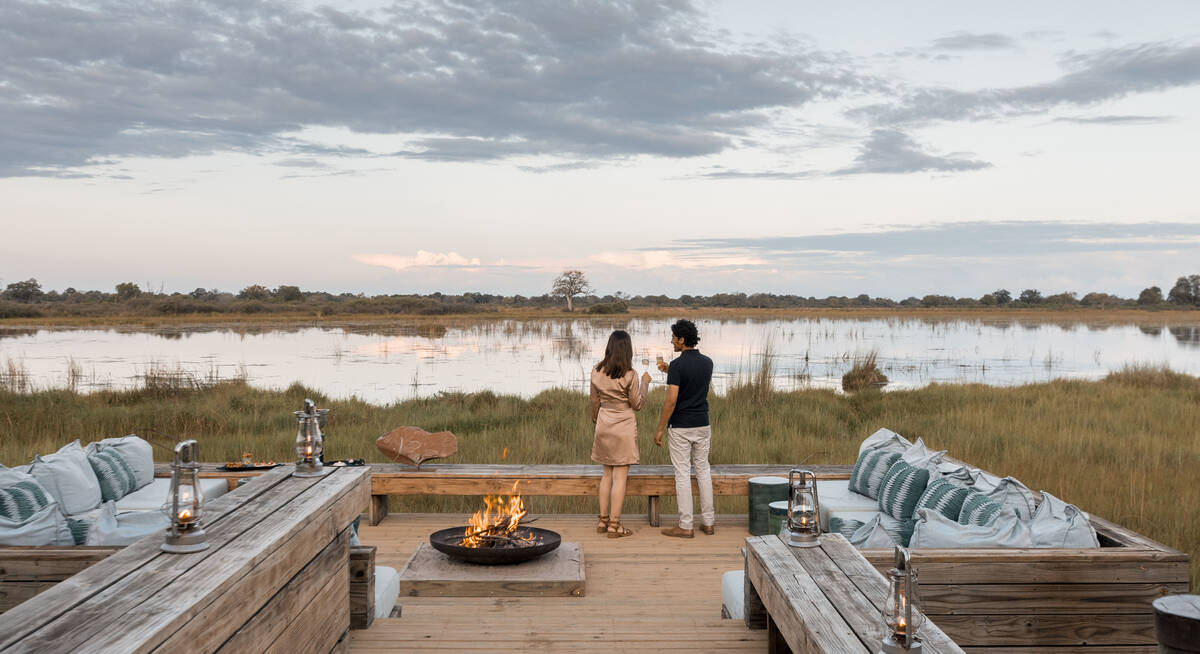
Reedbuck Safari
8 days • 3 locations
MAUN AIRPORT TO MAUN AIRPORT
Focussing on the Okavango Delta and combining the crème de la crème of Botswana’s camps – Zarafa, Vumbura Plains and Mombo – this is one of the finest safari experiences in Africa.
US$19,610 - US$36,280 per person

Steenbok Safari
9 days • 3 locations
MAUN AIRPORT TO MAUN AIRPORT
A classic Botswana safari exploring the Moremi, Chobe National Park and Okavango Delta. Excellent wildlife viewing and a variety of activities from three of our favourite traditional tented camps.
US$7,990 - US$13,480 per person
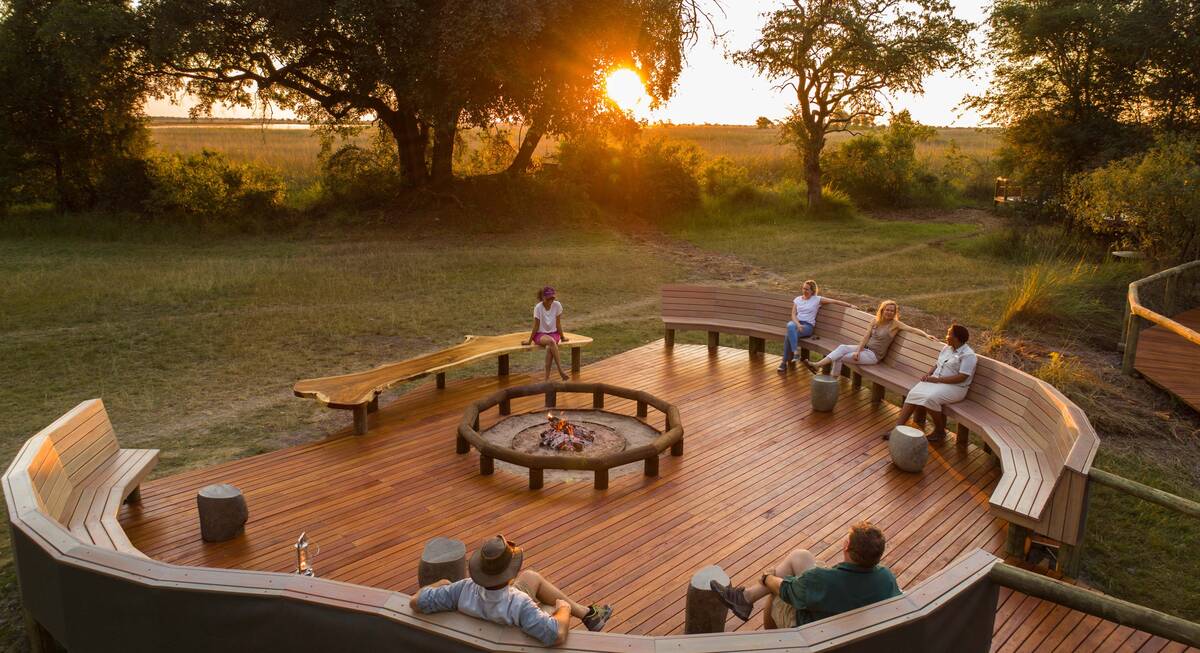
Wattled Crane Safari
5 days • 2 locations
MAUN AIRPORT TO MAUN AIRPORT
A good-value Botswana safari staying at comfortable lodges in prime wildlife-viewing areas – Chobe National Park and the Moremi Reserve in the Okavango Delta.
US$6,120 - US$8,090 per person
Top 22 lodges & safari camps in and around Moremi
The safari camps within Moremi Game Reserve are split into several areas: there are a handful in the publicly-accessible area around Xakanaxa Lagoon, and then a couple in private reserves with the park, on and around Chief's Island.
In addition, here we've included details of the camps which lie just outside the northern boundary of Moremi, in the private reserves around Khwai. Ask us for more details of what's where, and what's likely to suit you best!

Private Mobile
The Botswana Private Mobile Safari has no fixed location; it's exclusive to your group and comes with a top professional guide. Expect comfortable camping, great food, and a superb wildlife experience wherever you decide to go.

Machaba Camp
Overlooking the Khwai River to Moremi Game Reserve beyond, the classic Machaba Camp combines comfort with excellent game viewing.

Xigera Safari Lodge
Located deep in Botswana's Okavango Delta, Xigera Camp normally focuses on mokoro excursions and motorboat trips, with 4WD game drives when water levels permit.

Xakanaxa
Camp Xakanaxa is a well-established traditional camp beside a huge lagoon within the Moremi Game Reserve, with access to some superb wildlife viewing.

Khwai Lediba
Khwai Lediba offers a traditional African safari experience, with very comfortable tented accommodation, in a fantastic game area north of the Moremi Game Reserve.

Sable Alley
Smart, independent and well-run, Sable Alley overlooks a beautiful, hippo-filled lagoon within the diverse Khwai Private Reserve.

Okuti
With an innovative design and good service, Okuti Camp offers game drives and boat trips in a beautiful, game-rich part of Moremi Game Reserve.

Mombo Camp
Mombo is one of Botswana's most exclusive safari camps, set in a beautiful, remote location within the Moremi Game Reserve and with exceptional game densities.

Little Machaba
Overlooking the Khwai River and Moremi Game Reserve beyond, Little Machaba is a classically designed camp with very comfortable tents in a great game-viewing area.

Chief's Camp
Chief's Camp is situated on Chief's Island, within the Okavango Delta's Moremi Game Reserve. Experience one of Botswana's top game-viewing areas by 4WD and mokoro.
Excursions in & around Moremi Game Reserve
Optional extra day-drips and excursions whilst staying in and around Moremi. Talk to us: these are often best organised before you go.
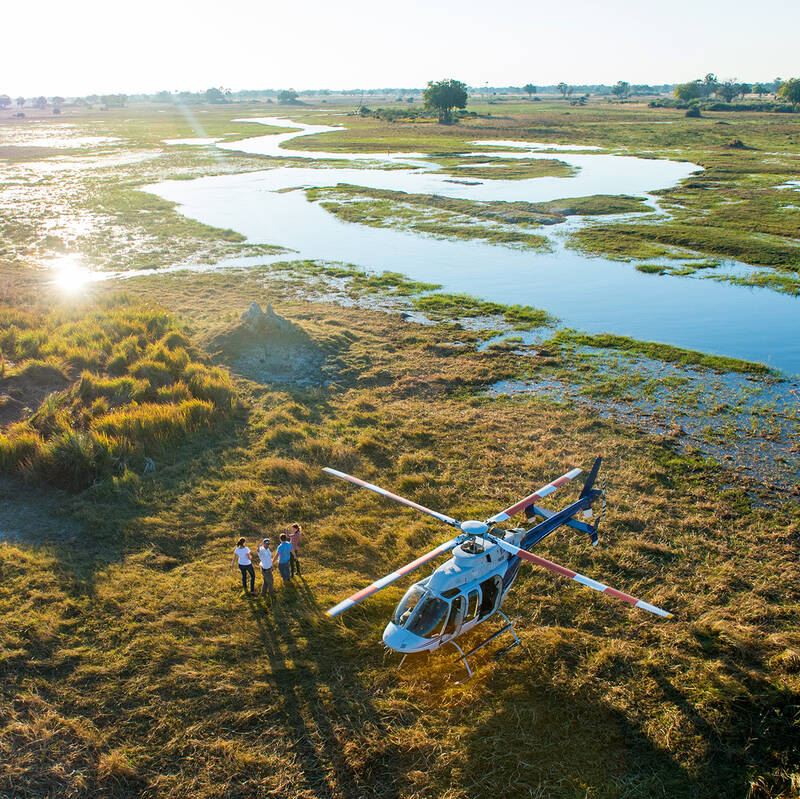
Helicopter Flight - Botswana
Various: from 30 minutes to half a day.
Low-flying, agile and offering superb views, helicopters are an ideal way to move around the Okavango Delta.You can use them instead of fixed-wing inter-lodge transfers or as an addition to other wildlife watching activities, and of course, helicopters can hover to allow that perfect pic, whereas fixed-wings can’t.
More about Helicopter Flight
Looking for inspiration on where to travel next?
Visit our trip chooser to explore your options and find inspiration for your perfect African adventure
Inspire me